The Ultimate Narrative Essay Guide for Beginners

A narrative essay tells a story in chronological order, with an introduction that introduces the characters and sets the scene. Then a series of events leads to a climax or turning point, and finally a resolution or reflection on the experience.
Speaking of which, are you in sixes and sevens about narrative essays? Don’t worry this ultimate expert guide will wipe out all your doubts. So let’s get started.
Table of Contents

Everything You Need to Know About Narrative Essay
What is a narrative essay.
When you go through a narrative essay definition, you would know that a narrative essay purpose is to tell a story. It’s all about sharing an experience or event and is different from other types of essays because it’s more focused on how the event made you feel or what you learned from it, rather than just presenting facts or an argument. Let’s explore more details on this interesting write-up and get to know how to write a narrative essay.
Elements of a Narrative Essay
Here’s a breakdown of the key elements of a narrative essay:
A narrative essay has a beginning, middle, and end. It builds up tension and excitement and then wraps things up in a neat package.
Real people, including the writer, often feature in personal narratives. Details of the characters and their thoughts, feelings, and actions can help readers to relate to the tale.
It’s really important to know when and where something happened so we can get a good idea of the context. Going into detail about what it looks like helps the reader to really feel like they’re part of the story.
Conflict or Challenge
A story in a narrative essay usually involves some kind of conflict or challenge that moves the plot along. It could be something inside the character, like a personal battle, or something from outside, like an issue they have to face in the world.
Theme or Message
A narrative essay isn’t just about recounting an event – it’s about showing the impact it had on you and what you took away from it. It’s an opportunity to share your thoughts and feelings about the experience, and how it changed your outlook.
Emotional Impact
The author is trying to make the story they’re telling relatable, engaging, and memorable by using language and storytelling to evoke feelings in whoever’s reading it.
Narrative essays let writers have a blast telling stories about their own lives. It’s an opportunity to share insights and impart wisdom, or just have some fun with the reader. Descriptive language, sensory details, dialogue, and a great narrative voice are all essentials for making the story come alive.
The Purpose of a Narrative Essay
A narrative essay is more than just a story – it’s a way to share a meaningful, engaging, and relatable experience with the reader. Includes:
Sharing Personal Experience
Narrative essays are a great way for writers to share their personal experiences, feelings, thoughts, and reflections. It’s an opportunity to connect with readers and make them feel something.
Entertainment and Engagement
The essay attempts to keep the reader interested by using descriptive language, storytelling elements, and a powerful voice. It attempts to pull them in and make them feel involved by creating suspense, mystery, or an emotional connection.
Conveying a Message or Insight
Narrative essays are more than just a story – they aim to teach you something. They usually have a moral lesson, a new understanding, or a realization about life that the author gained from the experience.
Building Empathy and Understanding
By telling their stories, people can give others insight into different perspectives, feelings, and situations. Sharing these tales can create compassion in the reader and help broaden their knowledge of different life experiences.
Inspiration and Motivation
Stories about personal struggles, successes, and transformations can be really encouraging to people who are going through similar situations. It can provide them with hope and guidance, and let them know that they’re not alone.
Reflecting on Life’s Significance
These essays usually make you think about the importance of certain moments in life or the impact of certain experiences. They make you look deep within yourself and ponder on the things you learned or how you changed because of those events.
Demonstrating Writing Skills
Coming up with a gripping narrative essay takes serious writing chops, like vivid descriptions, powerful language, timing, and organization. It’s an opportunity for writers to show off their story-telling abilities.
Preserving Personal History
Sometimes narrative essays are used to record experiences and special moments that have an emotional resonance. They can be used to preserve individual memories or for future generations to look back on.
Cultural and Societal Exploration
Personal stories can look at cultural or social aspects, giving us an insight into customs, opinions, or social interactions seen through someone’s own experience.
Format of a Narrative Essay
Narrative essays are quite flexible in terms of format, which allows the writer to tell a story in a creative and compelling way. Here’s a quick breakdown of the narrative essay format, along with some examples:
Introduction
Set the scene and introduce the story.
Engage the reader and establish the tone of the narrative.
Hook: Start with a captivating opening line to grab the reader’s attention. For instance:
Example: “The scorching sun beat down on us as we trekked through the desert, our water supply dwindling.”
Background Information: Provide necessary context or background without giving away the entire story.
Example: “It was the summer of 2015 when I embarked on a life-changing journey to…”
Thesis Statement or Narrative Purpose
Present the main idea or the central message of the essay.
Offer a glimpse of what the reader can expect from the narrative.
Thesis Statement: This isn’t as rigid as in other essays but can be a sentence summarizing the essence of the story.
Example: “Little did I know, that seemingly ordinary hike would teach me invaluable lessons about resilience and friendship.”
Body Paragraphs
Present the sequence of events in chronological order.
Develop characters, setting, conflict, and resolution.
Story Progression : Describe events in the order they occurred, focusing on details that evoke emotions and create vivid imagery.
Example : Detail the trek through the desert, the challenges faced, interactions with fellow hikers, and the pivotal moments.
Character Development : Introduce characters and their roles in the story. Show their emotions, thoughts, and actions.
Example : Describe how each character reacted to the dwindling water supply and supported each other through adversity.
Dialogue and Interactions : Use dialogue to bring the story to life and reveal character personalities.
Example : “Sarah handed me her last bottle of water, saying, ‘We’re in this together.'”
Reach the peak of the story, the moment of highest tension or significance.
Turning Point: Highlight the most crucial moment or realization in the narrative.
Example: “As the sun dipped below the horizon and hope seemed lost, a distant sound caught our attention—the rescue team’s helicopters.”
Provide closure to the story.
Reflect on the significance of the experience and its impact.
Reflection : Summarize the key lessons learned or insights gained from the experience.
Example : “That hike taught me the true meaning of resilience and the invaluable support of friendship in challenging times.”
Closing Thought : End with a memorable line that reinforces the narrative’s message or leaves a lasting impression.
Example : “As we boarded the helicopters, I knew this adventure would forever be etched in my heart.”
Example Summary:
Imagine a narrative about surviving a challenging hike through the desert, emphasizing the bonds formed and lessons learned. The narrative essay structure might look like starting with an engaging scene, narrating the hardships faced, showcasing the characters’ resilience, and culminating in a powerful realization about friendship and endurance.
Different Types of Narrative Essays
There are a bunch of different types of narrative essays – each one focuses on different elements of storytelling and has its own purpose. Here’s a breakdown of the narrative essay types and what they mean.
Personal Narrative
Description : Tells a personal story or experience from the writer’s life.
Purpose: Reflects on personal growth, lessons learned, or significant moments.
Example of Narrative Essay Types:
Topic : “The Day I Conquered My Fear of Public Speaking”
Focus: Details the experience, emotions, and eventual triumph over a fear of public speaking during a pivotal event.
Descriptive Narrative
Description : Emphasizes vivid details and sensory imagery.
Purpose : Creates a sensory experience, painting a vivid picture for the reader.
Topic : “A Walk Through the Enchanted Forest”
Focus : Paints a detailed picture of the sights, sounds, smells, and feelings experienced during a walk through a mystical forest.
Autobiographical Narrative
Description: Chronicles significant events or moments from the writer’s life.
Purpose: Provides insights into the writer’s life, experiences, and growth.
Topic: “Lessons from My Childhood: How My Grandmother Shaped Who I Am”
Focus: Explores pivotal moments and lessons learned from interactions with a significant family member.
Experiential Narrative
Description: Relays experiences beyond the writer’s personal life.
Purpose: Shares experiences, travels, or events from a broader perspective.
Topic: “Volunteering in a Remote Village: A Journey of Empathy”
Focus: Chronicles the writer’s volunteering experience, highlighting interactions with a community and personal growth.
Literary Narrative
Description: Incorporates literary elements like symbolism, allegory, or thematic explorations.
Purpose: Uses storytelling for deeper explorations of themes or concepts.
Topic: “The Symbolism of the Red Door: A Journey Through Change”
Focus: Uses a red door as a symbol, exploring its significance in the narrator’s life and the theme of transition.
Historical Narrative
Description: Recounts historical events or periods through a personal lens.
Purpose: Presents history through personal experiences or perspectives.
Topic: “A Grandfather’s Tales: Living Through the Great Depression”
Focus: Shares personal stories from a family member who lived through a historical era, offering insights into that period.
Digital or Multimedia Narrative
Description: Incorporates multimedia elements like images, videos, or audio to tell a story.
Purpose: Explores storytelling through various digital platforms or formats.
Topic: “A Travel Diary: Exploring Europe Through Vlogs”
Focus: Combines video clips, photos, and personal narration to document a travel experience.
How to Choose a Topic for Your Narrative Essay?
Selecting a compelling topic for your narrative essay is crucial as it sets the stage for your storytelling. Choosing a boring topic is one of the narrative essay mistakes to avoid . Here’s a detailed guide on how to choose the right topic:
Reflect on Personal Experiences
- Significant Moments:
Moments that had a profound impact on your life or shaped your perspective.
Example: A moment of triumph, overcoming a fear, a life-changing decision, or an unforgettable experience.
- Emotional Resonance:
Events that evoke strong emotions or feelings.
Example: Joy, fear, sadness, excitement, or moments of realization.
- Lessons Learned:
Experiences that taught you valuable lessons or brought about personal growth.
Example: Challenges that led to personal development, shifts in mindset, or newfound insights.
Explore Unique Perspectives
- Uncommon Experiences:
Unique or unconventional experiences that might captivate the reader’s interest.
Example: Unusual travels, interactions with different cultures, or uncommon hobbies.
- Different Points of View:
Stories from others’ perspectives that impacted you deeply.
Example: A family member’s story, a friend’s experience, or a historical event from a personal lens.
Focus on Specific Themes or Concepts
- Themes or Concepts of Interest:
Themes or ideas you want to explore through storytelling.
Example: Friendship, resilience, identity, cultural diversity, or personal transformation.
- Symbolism or Metaphor:
Using symbols or metaphors as the core of your narrative.
Example: Exploring the symbolism of an object or a place in relation to a broader theme.
Consider Your Audience and Purpose
- Relevance to Your Audience:
Topics that resonate with your audience’s interests or experiences.
Example: Choose a relatable theme or experience that your readers might connect with emotionally.
- Impact or Message:
What message or insight do you want to convey through your story?
Example: Choose a topic that aligns with the message or lesson you aim to impart to your readers.
Brainstorm and Evaluate Ideas
- Free Writing or Mind Mapping:
Process: Write down all potential ideas without filtering. Mind maps or free-writing exercises can help generate diverse ideas.
- Evaluate Feasibility:
The depth of the story, the availability of vivid details, and your personal connection to the topic.
Imagine you’re considering topics for a narrative essay. You reflect on your experiences and decide to explore the topic of “Overcoming Stage Fright: How a School Play Changed My Perspective.” This topic resonates because it involves a significant challenge you faced and the personal growth it brought about.
Narrative Essay Topics
50 easy narrative essay topics.
- Learning to Ride a Bike
- My First Day of School
- A Surprise Birthday Party
- The Day I Got Lost
- Visiting a Haunted House
- An Encounter with a Wild Animal
- My Favorite Childhood Toy
- The Best Vacation I Ever Had
- An Unforgettable Family Gathering
- Conquering a Fear of Heights
- A Special Gift I Received
- Moving to a New City
- The Most Memorable Meal
- Getting Caught in a Rainstorm
- An Act of Kindness I Witnessed
- The First Time I Cooked a Meal
- My Experience with a New Hobby
- The Day I Met My Best Friend
- A Hike in the Mountains
- Learning a New Language
- An Embarrassing Moment
- Dealing with a Bully
- My First Job Interview
- A Sporting Event I Attended
- The Scariest Dream I Had
- Helping a Stranger
- The Joy of Achieving a Goal
- A Road Trip Adventure
- Overcoming a Personal Challenge
- The Significance of a Family Tradition
- An Unusual Pet I Owned
- A Misunderstanding with a Friend
- Exploring an Abandoned Building
- My Favorite Book and Why
- The Impact of a Role Model
- A Cultural Celebration I Participated In
- A Valuable Lesson from a Teacher
- A Trip to the Zoo
- An Unplanned Adventure
- Volunteering Experience
- A Moment of Forgiveness
- A Decision I Regretted
- A Special Talent I Have
- The Importance of Family Traditions
- The Thrill of Performing on Stage
- A Moment of Sudden Inspiration
- The Meaning of Home
- Learning to Play a Musical Instrument
- A Childhood Memory at the Park
- Witnessing a Beautiful Sunset
Narrative Essay Topics for College Students
- Discovering a New Passion
- Overcoming Academic Challenges
- Navigating Cultural Differences
- Embracing Independence: Moving Away from Home
- Exploring Career Aspirations
- Coping with Stress in College
- The Impact of a Mentor in My Life
- Balancing Work and Studies
- Facing a Fear of Public Speaking
- Exploring a Semester Abroad
- The Evolution of My Study Habits
- Volunteering Experience That Changed My Perspective
- The Role of Technology in Education
- Finding Balance: Social Life vs. Academics
- Learning a New Skill Outside the Classroom
- Reflecting on Freshman Year Challenges
- The Joys and Struggles of Group Projects
- My Experience with Internship or Work Placement
- Challenges of Time Management in College
- Redefining Success Beyond Grades
- The Influence of Literature on My Thinking
- The Impact of Social Media on College Life
- Overcoming Procrastination
- Lessons from a Leadership Role
- Exploring Diversity on Campus
- Exploring Passion for Environmental Conservation
- An Eye-Opening Course That Changed My Perspective
- Living with Roommates: Challenges and Lessons
- The Significance of Extracurricular Activities
- The Influence of a Professor on My Academic Journey
- Discussing Mental Health in College
- The Evolution of My Career Goals
- Confronting Personal Biases Through Education
- The Experience of Attending a Conference or Symposium
- Challenges Faced by Non-Native English Speakers in College
- The Impact of Traveling During Breaks
- Exploring Identity: Cultural or Personal
- The Impact of Music or Art on My Life
- Addressing Diversity in the Classroom
- Exploring Entrepreneurial Ambitions
- My Experience with Research Projects
- Overcoming Impostor Syndrome in College
- The Importance of Networking in College
- Finding Resilience During Tough Times
- The Impact of Global Issues on Local Perspectives
- The Influence of Family Expectations on Education
- Lessons from a Part-Time Job
- Exploring the College Sports Culture
- The Role of Technology in Modern Education
- The Journey of Self-Discovery Through Education
Narrative Essay Comparison
Narrative essay vs. descriptive essay.
Here’s our first narrative essay comparison! While both narrative and descriptive essays focus on vividly portraying a subject or an event, they differ in their primary objectives and approaches. Now, let’s delve into the nuances of comparison on narrative essays.
Narrative Essay:
Storytelling: Focuses on narrating a personal experience or event.
Chronological Order: Follows a structured timeline of events to tell a story.
Message or Lesson: Often includes a central message, moral, or lesson learned from the experience.
Engagement: Aims to captivate the reader through a compelling storyline and character development.
First-Person Perspective: Typically narrated from the writer’s point of view, using “I” and expressing personal emotions and thoughts.
Plot Development: Emphasizes a plot with a beginning, middle, climax, and resolution.
Character Development: Focuses on describing characters, their interactions, emotions, and growth.
Conflict or Challenge: Usually involves a central conflict or challenge that drives the narrative forward.
Dialogue: Incorporates conversations to bring characters and their interactions to life.
Reflection: Concludes with reflection or insight gained from the experience.
Descriptive Essay:
Vivid Description: Aims to vividly depict a person, place, object, or event.
Imagery and Details: Focuses on sensory details to create a vivid image in the reader’s mind.
Emotion through Description: Uses descriptive language to evoke emotions and engage the reader’s senses.
Painting a Picture: Creates a sensory-rich description allowing the reader to visualize the subject.
Imagery and Sensory Details: Focuses on providing rich sensory descriptions, using vivid language and adjectives.
Point of Focus: Concentrates on describing a specific subject or scene in detail.
Spatial Organization: Often employs spatial organization to describe from one area or aspect to another.
Objective Observations: Typically avoids the use of personal opinions or emotions; instead, the focus remains on providing a detailed and objective description.
Comparison:
Focus: Narrative essays emphasize storytelling, while descriptive essays focus on vividly describing a subject or scene.
Perspective: Narrative essays are often written from a first-person perspective, while descriptive essays may use a more objective viewpoint.
Purpose: Narrative essays aim to convey a message or lesson through a story, while descriptive essays aim to paint a detailed picture for the reader without necessarily conveying a specific message.
Narrative Essay vs. Argumentative Essay
The narrative essay and the argumentative essay serve distinct purposes and employ different approaches:
Engagement and Emotion: Aims to captivate the reader through a compelling story.
Reflective: Often includes reflection on the significance of the experience or lessons learned.
First-Person Perspective: Typically narrated from the writer’s point of view, sharing personal emotions and thoughts.
Plot Development: Emphasizes a storyline with a beginning, middle, climax, and resolution.
Message or Lesson: Conveys a central message, moral, or insight derived from the experience.
Argumentative Essay:
Persuasion and Argumentation: Aims to persuade the reader to adopt the writer’s viewpoint on a specific topic.
Logical Reasoning: Presents evidence, facts, and reasoning to support a particular argument or stance.
Debate and Counterarguments: Acknowledge opposing views and counter them with evidence and reasoning.
Thesis Statement: Includes a clear thesis statement that outlines the writer’s position on the topic.
Thesis and Evidence: Starts with a strong thesis statement and supports it with factual evidence, statistics, expert opinions, or logical reasoning.
Counterarguments: Addresses opposing viewpoints and provides rebuttals with evidence.
Logical Structure: Follows a logical structure with an introduction, body paragraphs presenting arguments and evidence, and a conclusion reaffirming the thesis.
Formal Language: Uses formal language and avoids personal anecdotes or emotional appeals.
Objective: Argumentative essays focus on presenting a logical argument supported by evidence, while narrative essays prioritize storytelling and personal reflection.
Purpose: Argumentative essays aim to persuade and convince the reader of a particular viewpoint, while narrative essays aim to engage, entertain, and share personal experiences.
Structure: Narrative essays follow a storytelling structure with character development and plot, while argumentative essays follow a more formal, structured approach with logical arguments and evidence.
In essence, while both essays involve writing and presenting information, the narrative essay focuses on sharing a personal experience, whereas the argumentative essay aims to persuade the audience by presenting a well-supported argument.
Narrative Essay vs. Personal Essay
While there can be an overlap between narrative and personal essays, they have distinctive characteristics:
Storytelling: Emphasizes recounting a specific experience or event in a structured narrative form.
Engagement through Story: Aims to engage the reader through a compelling story with characters, plot, and a central theme or message.
Reflective: Often includes reflection on the significance of the experience and the lessons learned.
First-Person Perspective: Typically narrated from the writer’s viewpoint, expressing personal emotions and thoughts.
Plot Development: Focuses on developing a storyline with a clear beginning, middle, climax, and resolution.
Character Development: Includes descriptions of characters, their interactions, emotions, and growth.
Central Message: Conveys a central message, moral, or insight derived from the experience.
Personal Essay:
Exploration of Ideas or Themes: Explores personal ideas, opinions, or reflections on a particular topic or subject.
Expression of Thoughts and Opinions: Expresses the writer’s thoughts, feelings, and perspectives on a specific subject matter.
Reflection and Introspection: Often involves self-reflection and introspection on personal experiences, beliefs, or values.
Varied Structure and Content: Can encompass various forms, including memoirs, personal anecdotes, or reflections on life experiences.
Flexibility in Structure: Allows for diverse structures and forms based on the writer’s intent, which could be narrative-like or more reflective.
Theme-Centric Writing: Focuses on exploring a central theme or idea, with personal anecdotes or experiences supporting and illustrating the theme.
Expressive Language: Utilizes descriptive and expressive language to convey personal perspectives, emotions, and opinions.
Focus: Narrative essays primarily focus on storytelling through a structured narrative, while personal essays encompass a broader range of personal expression, which can include storytelling but isn’t limited to it.
Structure: Narrative essays have a more structured plot development with characters and a clear sequence of events, while personal essays might adopt various structures, focusing more on personal reflection, ideas, or themes.
Intent: While both involve personal experiences, narrative essays emphasize telling a story with a message or lesson learned, while personal essays aim to explore personal thoughts, feelings, or opinions on a broader range of topics or themes.

A narrative essay is more than just telling a story. It’s also meant to engage the reader, get them thinking, and leave a lasting impact. Whether it’s to amuse, motivate, teach, or reflect, these essays are a great way to communicate with your audience. This interesting narrative essay guide was all about letting you understand the narrative essay, its importance, and how can you write one.
Order Original Papers & Essays
Your First Custom Paper Sample is on Us!
Timely Deliveries
No Plagiarism & AI
100% Refund
Try Our Free Paper Writing Service
Related blogs.

Connections with Writers and support
Privacy and Confidentiality Guarantee
Average Quality Score
Narrative Essay Topics: TOP 200 Choices for Students

Imagine yourself facing a blank page, ready to fill it with your memories and imagination. What story will you tell today?
As students, you often have to write narratives that capture people's attention. But with so many stories to choose from, where do you start? How do you find the perfect topic that will grab our readers' interest and make them think?
Join our essay service experts as we explore 200 topics for college where stories are waiting to be told, and experiences are ready to be shared. From everyday events to unforgettable moments, each topic is a chance to connect with your readers and make them feel something.

Do You Need Professional Help with Your Hometask?
Ideas for Narrative Essay Topics
After exploring how students write narrative paragraphs, we've put together a list of narrative essay topics designed specifically for college and school students. This list covers a wide range of subjects, so pick one that speaks to you! If you want to see how to develop a topic into a written essay, check out our narrative essay example .
Literacy Narrative Essay Topics for College Students
How about delving into captivating literacy narrative essay topics designed specifically for college-level writing? Exciting, isn't it?
- How did a childhood book shape your view of the world?
- What challenges did you face when learning to read in a second language?
- How has storytelling within your family influenced your literacy journey?
- Can you recall a pivotal moment that ignited your love for reading?
- How did a specific teacher inspire your passion for literature?
- Have you ever encountered a character in a book who profoundly impacted your perspective on life?
- What role did writing play in helping you navigate a difficult period in your life?
- How has your relationship with technology affected your reading habits?
- What cultural or historical event sparked your interest in a particular genre of literature?
- How has poetry shaped your understanding of language and emotion?
- Have you ever experienced a breakthrough moment in your writing process?
- How has reading aloud impacted your comprehension and enjoyment of literature?
- Can you recall a time when a book challenged your beliefs or worldview?
- How has participating in a book club enriched your reading experience?
- What strategies have you developed to overcome reading difficulties or distractions?
Personal Narrative Essay Topics on Relationships
Take a moment to reflect on your past experiences and craft compelling personal narratives with these essay ideas.
- How did a specific friendship shape who you are today?
- Can you recount a moment that strengthened your bond with a family member?
- What challenges have you faced in maintaining a long-distance relationship?
- How has a mentor influenced your personal and professional development?
- Have you experienced a betrayal in a relationship? How did it impact you?
- Can you describe a memorable conflict resolution process within a relationship?
- How has your relationship with a pet affected your emotional well-being?
- What lessons have you learned from navigating a romantic relationship?
- How has your relationship with a sibling evolved over time?
- Can you recall a time when you had to set boundaries in a friendship?
- How has volunteering or community involvement enriched your relationships?
- What cultural differences have influenced your relationships with others?
- Can you share a moment when you felt truly understood by someone?
- How has technology affected the dynamics of your relationships?
- Have you ever experienced a reconciliation that transformed a strained relationship?
Best Narrative Essay Topics on Education and Learning
Consider the beauty of sharing your personal experiences and emotions in a captivating manner through these ideas for personal narrative essays.
- What was the most valuable lesson you learned outside of the classroom?
- Can you recount a moment when a teacher's unconventional method transformed your understanding of a subject?
- How has a field trip or experiential learning opportunity impacted your education?
- What challenges have you faced in balancing extracurricular activities with academics?
- Have you ever had a "Eureka!" moment while studying? Describe it.
- How has learning a new skill outside of school influenced your academic performance?
- Can you recall a time when a peer's perspective challenged your own understanding of a topic?
- How has technology enhanced or hindered your learning experience?
- What role does creativity play in your approach to learning?
- Have you ever experienced a setback that ultimately propelled you forward academically?
- How has your cultural background influenced your learning style?
- Can you describe a time when you had to advocate for yourself within an educational setting?
- How has mentorship shaped your educational journey?
- What strategies have you employed to overcome academic challenges or obstacles?
- Can you reflect on a time when failure taught you a valuable lesson about learning?
At this point, we think you might've already been interested in our term paper writing service that helps busy students succeed in college.
Personal Narrative Essay Ideas on Reflection on Life
Why not ignite your creativity with a range of narrative essay topics, from extraordinary moments to everyday experiences?
- How has a moment of failure ultimately led to personal growth and resilience?
- Can you recount a pivotal decision that significantly altered the course of your life?
- What lessons have you learned from navigating a crossroads or major life transition?
- How has your perspective on success evolved over time?
- Can you reflect on a time when you had to confront and overcome a deeply held fear?
- What role has gratitude played in shaping your outlook on life?
- How have your values and beliefs been influenced by significant life experiences?
- Can you describe a moment when you found clarity and purpose amidst chaos or uncertainty?
- What impact has traveling to a new place had on your understanding of the world and yourself?
- How has adversity strengthened your character and determination?
- Can you recall a time when a random act of kindness profoundly impacted your life?
- What lessons have you learned from embracing vulnerability and authenticity in relationships?
- How has practicing mindfulness or self-reflection enhanced your well-being and happiness?
- Can you reflect on a period of personal transformation or self-discovery?
- How have you found meaning and fulfillment in pursuing your passions and interests?
Ideas for a Narrative Essay on Culture and Society
Engaging your readers with narrative essays on culture and society is a great way to spark interest, offering captivating ideas for exploration.
- How has your family's unique culinary heritage influenced your cultural identity?
- Can you reflect on a specific cultural artifact or heirloom that holds deep significance for your family?
- What challenges have you faced in preserving traditional customs while adapting to modern societal expectations?
- How has a local festival or celebration revealed the intricacies of your community's cultural tapestry?
- Can you recount a moment when you navigated a cultural clash between your upbringing and the dominant culture?
- How has your experience as a first-generation immigrant shaped your understanding of cultural assimilation?
- What lessons have you learned from participating in intercultural exchange programs or initiatives?
- Can you describe a unique cultural practice or tradition within your community that outsiders might find intriguing or misunderstood?
- How has the revitalization of indigenous languages contributed to the preservation of cultural heritage in your region?
- Can you reflect on a personal journey of reconnecting with your cultural roots after a period of assimilation or disconnection?
- What role does storytelling play in passing down cultural wisdom and values within your family or community?
- How has the portrayal of your culture in mainstream media affected your sense of belonging and self-perception?
- Can you recount a moment when you challenged cultural stereotypes through creative expression or advocacy?
- How has the migration of a specific cultural group enriched the social fabric and economic landscape of your community?
- What initiatives or grassroots movements are currently underway to promote cross-cultural understanding and cooperation in your society?
Since you're working on essays, we think it's suitable to suggest you learn more about the case study format , which is another common college assignment.
Narrative Writing Topics on Hobbies and Interests
Wow your readers by turning your passions and hobbies into compelling narrative essay topics that will get them thinking.
- How has your passion for urban gardening transformed neglected spaces in your community?
- Can you recount a thrilling adventure from your hobby of urban exploration?
- What lessons have you learned from restoring vintage motorcycles in your spare time?
- How has your fascination with birdwatching deepened your connection to nature and conservation efforts?
- Can you describe a memorable moment from your hobby of foraging wild edibles in the wilderness?
- What unique skills have you developed through your hobby of beekeeping, and how have they impacted your daily life?
- How has your interest in historical reenactment brought the past to life in unexpected ways?
- Can you reflect on a transformative experience from your hobby of landscape photography?
- What insights have you gained from practicing the art of bonsai cultivation and nurturing miniature ecosystems?
- How has your passion for stargazing inspired awe and wonder in the vastness of the universe?
- Can you recount a challenging project from your hobby of woodworking and the satisfaction it brought upon completion?
- What cultural connections have you discovered through your hobby of traditional folk dancing?
- How has your interest in sustainable fashion influenced your consumer habits and environmental awareness?
- Can you describe a moment of serenity and mindfulness experienced while practicing the art of tea ceremony?
- How has your hobby of letterpress printing preserved the tactile beauty of handmade craftsmanship in a digital age?
Narrative Essay Titles on Life-Changing Moments
Life is full of unexpected twists that can lead to life-changing moments. Take a look at these narrative essay titles for stories that have had a lasting impact on your life.
- How did surviving a natural disaster reshape your perspective on life?
- Can you recall a single conversation that drastically altered the course of your life?
- What was the pivotal moment that inspired you to pursue your dreams against all odds?
- How did a chance encounter lead to a life-changing friendship or partnership?
- Can you reflect on the decision that transformed your career trajectory?
- What profound lesson did you learn from facing a life-threatening illness or injury?
- How did traveling to a new country open your eyes to new possibilities and opportunities?
- Can you recount the moment when you discovered your true passion or calling in life?
- What was the turning point that allowed you to break free from a toxic relationship or environment?
- How did experiencing failure or rejection ultimately lead to personal growth and resilience?
- Can you describe the moment when you found the strength to overcome a deep-seated fear or insecurity?
- What life-changing realization did you have while experiencing a period of solitude or introspection?
- How did a profound act of kindness from a stranger restore your faith in humanity?
- Can you reflect on the moment when you forgave someone who had deeply hurt you, and how it changed your perspective on forgiveness?
- What pivotal decision did you make that allowed you to reclaim control over your own happiness and destiny?
Have you ever wondered about the challenges of essay writing? What happens when you're assigned a larger paper, like coursework? Make a preemptive strike by exploring coursework writing service right now!
Good Narrative Topics on Travel and Adventure
Consider creating intriguing titles for your narrative essay ideas by exploring thrilling travel adventures.
- Can you recount a memorable encounter with wildlife during your solo hiking adventure?
- How did a spontaneous decision to explore an unfamiliar city lead to unexpected discoveries?
- What lessons did you learn from navigating a foreign country with only a map and your instincts?
- Can you describe the exhilaration of conquering a challenging mountain peak for the first time?
- How did immersing yourself in a local culture during your travels broaden your perspective on the world?
- What unexpected obstacles did you encounter while embarking on a backpacking journey through rugged terrain?
- Can you reflect on the transformative experience of volunteering abroad in a community-driven project?
- How did getting lost in a labyrinthine city alleyway lead to serendipitous encounters and newfound friendships?
- What was the most memorable meal you had while sampling street food in a bustling market abroad?
- Can you recount the adrenaline rush of participating in an extreme sports activity in a foreign land?
- How did witnessing a breathtaking natural phenomenon during your travels leave a lasting impression on you?
- What cultural traditions or rituals did you participate in during a homestay experience with a local family?
- Can you describe the sense of wonder and awe you felt while exploring ancient ruins or historical sites?
- How did navigating a language barrier challenge and ultimately enrich your travel experience?
- What valuable life lessons did you learn from the mishaps and misadventures encountered during your journey off the beaten path?
Narrative Essay Topic Ideas on Career and Work Experience
College students can uncover captivating narrative essay ideas by exploring potential career paths or reminiscing about past job experiences.
- How did a challenging project at work showcase your problem-solving skills and resilience?
- Can you reflect on a pivotal mentorship experience that guided your career trajectory?
- What valuable lessons did you learn from a career setback or failure, and how did it shape your future success?
- How did a workplace conflict lead to personal growth and improved communication skills?
- Can you recount a moment when taking a professional risk paid off in unexpected ways?
- What insights did you gain from transitioning to a new industry or career path?
- How did participating in a cross-functional team project enhance your collaboration and leadership abilities?
- Can you describe the satisfaction of achieving a long-term career goal after years of hard work and perseverance?
- What impact did a meaningful recognition or award have on your motivation and sense of accomplishment?
- How did volunteering or pro bono work contribute to your professional development and sense of purpose?
- Can you reflect on the decision to leave a stable job in pursuit of passion or fulfillment?
- What strategies did you employ to navigate a toxic work environment and maintain your well-being?
- How did a career setback lead to unexpected opportunities for personal and professional growth?
- Can you describe a moment when mentorship or sponsorship played a crucial role in advancing your career?
- What lessons did you learn from a challenging client or customer interaction, and how did it shape your approach to customer service and relationship-building?
Interesting Narrative Essay Topics about Challenges and Obstacles
If you're not sure what to write about for your narrative essay, think back to the tough times you've had and how you managed to get through them.
- How did you conquer a once-paralyzing fear to chase your dreams?
- What new strengths did you discover while adapting to a physical challenge?
- Can you recall a creative solution you used during a tough financial period?
- When did you bravely stand against injustice, despite opposition?
- How did overcoming a language barrier broaden your horizons?
- What key lessons did you learn from a major setback in your life?
- How did you manage overwhelming stress and responsibilities?
- What inner reserves of resilience did you draw upon after personal loss?
- Describe a time when you defied societal norms to pursue your goals.
- Reflect on a moment when failure fueled your determination for success.
- When did you find the courage to leave your comfort zone behind?
- How did community support bolster you through a challenging time?
- Share a time when self-doubt led to newfound confidence.
- Can you recount a tragedy that spurred your personal growth?
- What insights did overcoming a monumental obstacle reveal about life?
Best Narrative Essay Topics: How to Choose the One That Resonates
A narrative essay is a type of writing that tells a personal story, including characters, plot, setting, and the order of events. Its main goal is to connect with readers emotionally and share a specific message or insight through the retelling of a meaningful experience.
Students write narrative essays as part of their studies for several reasons. Firstly, it allows them to express themselves creatively by sharing their unique experiences, thoughts, and feelings. Secondly, it helps them develop important writing skills like organizing ideas and thoughts effectively.
.webp)
Choosing good narrative essay ideas involves looking at personal experiences, interests, and the potential for engaging storytelling. Here's a simple guide to help you pick the right topic:
- Think about significant moments in your life that had a lasting impact, such as personal growth or overcoming challenges.
- Choose topics related to your hobbies, interests, or areas of expertise to make your story more engaging.
- Consider what your audience would be interested in and choose topics that resonate with them.
- Focus on a specific event or detail to make your narrative more focused and impactful.
- Look for universal themes like love or personal transformation that connect with readers on a deeper level.
- Brainstorm ideas and write freely to uncover compelling topics.
- Decide on storytelling techniques like flashbacks or foreshadowing and choose a topic that fits.
- Get feedback from friends, peers, or instructors to see if your topics are interesting and impactful.
- Choose topics that evoke strong emotions for a more compelling narrative.
- Select a topic that you personally connect with to make your story authentic.
Once you've chosen a topic, brainstorm ideas and create an outline for your essay. Follow your professor's instructions carefully and consider seeking help from our narrative essay writing service if needed.
Bring your stories to life with EssayPro. Select from a vast array of narrative essay topics and let our professionals help you weave your tales into captivating essays. Whether it's adventure, reflection, or imagination, we're here to assist.
Final Remarks
As we wrap up, our list of 200 narrative essay topics is here to fuel your creativity for your next writing project! Whether you're sharing a memorable event, reliving a childhood memory, or expressing a profound insight, crafting a narrative essay can be an uplifting experience that resonates deeply with readers.
And if you're gearing up for college admissions, why not check out our admission essay writing service ? We've already assisted countless students in securing their spots at their dream colleges, and we'd love to help you, too!
Give Us Your Task
We provide assistance as well as editing and proofreading. Every paper we deal with is written and triple-checked by a team of experts—which means that you are guaranteed to get top-quality work from our term paper writing service . Order now!

Daniel Parker
is a seasoned educational writer focusing on scholarship guidance, research papers, and various forms of academic essays including reflective and narrative essays. His expertise also extends to detailed case studies. A scholar with a background in English Literature and Education, Daniel’s work on EssayPro blog aims to support students in achieving academic excellence and securing scholarships. His hobbies include reading classic literature and participating in academic forums.

is an expert in nursing and healthcare, with a strong background in history, law, and literature. Holding advanced degrees in nursing and public health, his analytical approach and comprehensive knowledge help students navigate complex topics. On EssayPro blog, Adam provides insightful articles on everything from historical analysis to the intricacies of healthcare policies. In his downtime, he enjoys historical documentaries and volunteering at local clinics.
Related Articles
.webp)

How do writers develop good story ideas? Sometimes, coming up with a story idea is the hardest part about writing fiction. Figuring out what to write about can be frustrating, as the desire to create meets the uncertainty surrounding where to begin.
Writers are often taught how to write their stories, but not how to develop good story ideas. Luckily, the best fiction prompts are already in your head. Let’s answer a common question for fiction writers stuck on the blank page: What should I do if I want to write fiction but have no story ideas?
- What Goes Into a Good Story Idea?
- Start With the Six Elements of Fiction
- Start With a Story You Want to Read
- Modify a Story Idea That Already Exists
- Start With a Creative Writing Prompt
- Find Inspiration in Wordplay
- Let Yourself Experience Boredom
- Start From Real Life
Finding What to Write About: What Goes Into a Good Story Idea?
There’s no strict definition of a “good story idea.” In fact, many good stories are good because of the way they’re written. You might have heard someone say that every idea has already been written, and while this approach to creative writing is a bit cynical, it’s true that many stories can be reduced to similar narrative arcs .
A striking example of this is the Shakespeare play Hamlet and the Disney movie The Lion King. These two stories have many differences, but they have the same story premise: an orphan prince must avenge the death of his father, to the chagrin of a shady uncle and an unstable family.

Both works of fiction share the same premise, but audiences perceive them differently since they have different writing styles, intended audiences, and storytelling purposes.
Thus, there’s no clear anatomy of a good story idea. As a general rule, however, your idea for a story should answer the following questions:
- Who is your main character?
- What does your main character want?
- What prevents the main character from getting what they want? (What is the conflict ?)
The rest is up for you to decide. With this in mind, let’s consider different starting points for how to come up with story ideas.
7 Ways to Come Up With Great Story Ideas
When you ask yourself “ What should I write about?”, starting with one of these methods will go a long way to help you develop good story ideas.
1. Start With the Six Elements of Fiction
The blank page can be overwhelming. As you consider the infinite possibilities of language, it’s easy to get so lost in the details that you lose sight of a clear idea. If you’re the type of writer who gets overwhelmed by the whole process, try coming up with story ideas through a piecemeal approach, by considering the six elements of fiction:
- Plot : the “what happens” of your story
- Characters : whose lives are we watching?
- Setting : the world that the story is set in
- Point of View : from whose eyes do we see the story unfold?
- Theme : the “deeper meaning” of the story, or what the story represents
- Style : how you use words to tell the story
You can read in-depth about each of these in our article on the six elements of fiction.
For example, you might benefit by just starting with a character. Think about different character details, from their physical traits to the things they most desire. From there, you can think about what’s getting in the way of this character’s success, and craft the plot and world around them.
Or you can start with setting. Create the world you want to write in, whether that world is realistic, magical, or somewhere off Earth entirely. Then, think about the limitations of this world and how it both helps and hurts its people; from there, you can craft your characters and plot.
You might even start with style. If you want your story to use certain language, style can act as a scaffolding to story. For example, Toni Morrison wrote her novel Jazz because she wanted to write a story that spontaneously rises and falls in energy and emotion, much like jazz music does. The result is a story that traverses a slice of the early-20th-century African-American experience through Black culture and music, using style to guide and write the story itself.
2. Start With a Story You Want to Read
Toni Morrison said it best: “If there’s a book that you want to read, but it hasn’t been written yet, then you must write it.”
Think about a story you’ve always wanted to read. This doesn’t have to be a story that’s revolutionary and wholly unique; start with what you want to read in fiction. For example, maybe you like reading stories that bend genres , and you want a story that combines mystery, romance, historical fiction, and science fiction, but you haven’t read anything like it.
The reason you haven’t read it is because you haven’t written it! Take some time to think about a story you want in the world — whether that’s a story you needed when you were younger, a story that other people need to hear, or a story you’ve always wanted told. Then write it.
3. Modify a Story Idea That Already Exists
No, you can’t publish your version of The Great Gatsby where every character and detail is the same, except it’s set in Oshkosh, Wisconsin. However, you can start a story from literature that already exists.
In fact, many great works of literature started as, to use a modern term, fanfiction. Shakespeare’s Othello was inspired by a poem called “ The Moorish Captain ”—he even used the same names and borrowed themes of love and vengeance. Alexandre Dumas wrote The Three Musketeers as fanfiction to a memoir of a French musketeer titled Mémoires de Monsieur d’Artagnan . Finally, William Golding was inspired to write Lord of the Flies after reading the children’s book The Coral Island , a story about three marooned boys from England.
If you’re afraid to call a story “fanfiction,” think of it as a way of improving a story you already love. Make it your own, change your characters, and develop new story ideas. You might just write the next classic!
4. Start With a Creative Writing Prompt
Chances are, you’ve been told to use writing prompts, but not how to use writing prompts. The best way to write from a prompt is to freewrite from the story idea, then edit from there.
For example, let’s say you’re given this prompt: Write a story about a psychic psychiatrist . If you choose to use this prompt, but don’t know where to begin, do a timed freewrite where you “free associate” all of your ideas onto the page. Write for five minutes about what the word “psychic” makes you think of. Give another five minutes to “psychiatrist.”
Then, comb through your freewrite and let your journaling inspire some story ideas. Perhaps you wrote down something about a crystal ball in a psychiatrist’s office, or you imagined a circus tent filled with prescriptions. Let your great story ideas unfold naturally, then write from there.
If you’d like some writing prompts to get you started, here are 24 exercises we think you’ll love.
5. Find Inspiration in Wordplay
Sometimes, words themselves inspire. Drawing creativity from puns , word play , alliterations, and onomatopoeias can create the most unique and interesting stories.
Take our last prompt, for example. Both words in the phrase “psychic psychiatrist” start with “psych,” yet they have vastly different meanings. Psychiatrists are academics, whereas psychics are mystics. What story can you find in the duality of science versus magic? Are they more similar than we realize? Find moments of tension or ambiguity in language, and go from there.
6. Let Yourself Experience Boredom
Most people dislike boredom. However, as creatives, we should embrace it. Why? Because boredom actually boosts creativity.
Our brains prefer a certain level of stimulation. When we feel boredom, our brains are telling us that we’re understimulated. Often, we turn to entertainment when we’re bored—our phones, books, TVs, significant others, etc.
When we don’t turn towards external stimuli, however, our brains produce their own stories and ideas to stay stimulated and entertained. Thus, boredom actually encourages creativity, and if we let our minds wander without external distractions, we might come across great story ideas that need to be written.
7. Start From Real Life
Our last tip is to start from real life experiences. Many stories—including stories of fantasy and sci-fi—create convincing worlds because they’re modeled after real life. You don’t need to write about your personal experiences themselves, but you can draw from them to write poignant fiction.
For example, Stephen King wrote The Shining after staying in a notoriously haunted hotel that left him with nightmares. That hotel and those nightmares inspired the hotel of The Shining, which is arguably a character within the novel itself.
You can also pull from popular news and events. Agatha Christie wrote her novel Murder on the Orient Express after reading about the kidnapping and murder of Charles Lindbergh’s son.
Finally, you can pull from historical events and even write historical fiction. Chimamanda Ngozi Adichie does this in her novel Half of a Yellow Sun , which explores the rise and fall of Biafra, a short-lived African nation in the late 1960s.
As Mark Twain once said, “Truth is stranger than fiction.” Start from real life and see where your story idea goes.
Develop a Great Story Idea With a Writing Community
The best writing ideas are developed through collaboration and feedback. If you’re looking for an extra set of eyes on your story ideas or fiction drafts, look no further than the Writers.com community. We’ve been in the writing business for over 25 years, and with a strong team of creative writing instructors, we can help make the seed of a story blossom.
Learn more about our upcoming fiction courses , and us on Facebook Draw inspiration from our community of writers, and get to work on your next great fiction idea!
Sean Glatch
15 comments.
Loved your content Sean <3 very well-written! Creativity comes from all sources, but if you’re setting out to write your book for the first time, you need to figure out the best story idea that everyone will remember. Check this out How to Come Up With Great Story Ideas
Cheers, Caroleann
I completely agree with what you have written. I hope this post could reach more people as this was truly an interesting post.
This is incredible advice. Happy to have found it. Thank you!
this helped a lot thanks !
Great work guys
Thanks its help me writing my scripts for my game
May God bless you for sharing!❤️💝💝
This article helps lots! Thank you!
I used these ideas to form my first ever story and submitted it to the Yong Writers Award, Bennington College… Thank you so much, Sean.
Cheers, Lord Heat
[…] Writers.com. (2020). 7 Ways to Come Up With Great Story Ideas. [online] Available at: https://writers.com/how-to-come-up-with-story-ideas . […]
Thank you so much for this!!! This was genuinely very fun to read, btw
Fruitful and helpful information. Thanks a lot! I helped me revising my sixth novel.
Sean: – For about two years I’ve been thinking about bits for a story but the most creative action I’ve had is filling the crumpled paper bin with pages proving at best to be great complement to my fireplace kindling. I keep seeing the words “Keep on Writing” but my story is still wandering around with the other unwritten ideas inside my head. Actually quite similar to a box of paperclips where one or two, or several may come out but never enough to string together in any usefull fashion! Am going to re-read and try again. Sean, again tks for putting the “7 Ways…” out there.
Best of luck, Robert!
[…] and here’s another one: https://writers.com/how-to-come-up-with-story-ideas and another: https://kindlepreneur.com/how-to-come-up-with-book-ideas/Some suggestions that I […]
Leave a Comment Cancel Reply
Save my name, email, and website in this browser for the next time I comment.
Purdue Online Writing Lab Purdue OWL® College of Liberal Arts
Narrative Essays

Welcome to the Purdue OWL
This page is brought to you by the OWL at Purdue University. When printing this page, you must include the entire legal notice.
Copyright ©1995-2018 by The Writing Lab & The OWL at Purdue and Purdue University. All rights reserved. This material may not be published, reproduced, broadcast, rewritten, or redistributed without permission. Use of this site constitutes acceptance of our terms and conditions of fair use.
What is a narrative essay?
When writing a narrative essay, one might think of it as telling a story. These essays are often anecdotal, experiential, and personal—allowing students to express themselves in a creative and, quite often, moving ways.
Here are some guidelines for writing a narrative essay.
- If written as a story, the essay should include all the parts of a story.
This means that you must include an introduction, plot, characters, setting, climax, and conclusion.
- When would a narrative essay not be written as a story?
A good example of this is when an instructor asks a student to write a book report. Obviously, this would not necessarily follow the pattern of a story and would focus on providing an informative narrative for the reader.
- The essay should have a purpose.
Make a point! Think of this as the thesis of your story. If there is no point to what you are narrating, why narrate it at all?
- The essay should be written from a clear point of view.
It is quite common for narrative essays to be written from the standpoint of the author; however, this is not the sole perspective to be considered. Creativity in narrative essays oftentimes manifests itself in the form of authorial perspective.
- Use clear and concise language throughout the essay.
Much like the descriptive essay, narrative essays are effective when the language is carefully, particularly, and artfully chosen. Use specific language to evoke specific emotions and senses in the reader.
- The use of the first person pronoun ‘I’ is welcomed.
Do not abuse this guideline! Though it is welcomed it is not necessary—nor should it be overused for lack of clearer diction.
- As always, be organized!
Have a clear introduction that sets the tone for the remainder of the essay. Do not leave the reader guessing about the purpose of your narrative. Remember, you are in control of the essay, so guide it where you desire (just make sure your audience can follow your lead).
What are your chances of acceptance?
Calculate for all schools, your chance of acceptance.
Your chancing factors
Extracurriculars.
50 Engaging Narrative Essay Topics for High Schoolers
Do you know how to improve your profile for college applications.
See how your profile ranks among thousands of other students using CollegeVine. Calculate your chances at your dream schools and learn what areas you need to improve right now — it only takes 3 minutes and it's 100% free.
Show me what areas I need to improve
What’s Covered:
Narrative essays vs. analytical essays, how to pick the right narrative essay topic, elements of a strong narrative essay, engaging narrative essay topics for high schoolers, where to get your narrative essay edited for free.
Narrative essays are an extensive form of writing that gives readers the opportunity to follow along as a person goes through a journey or sets of experiences. Rather than providing analytic insight, narrative essays simply share a story and offer a first-person account. These essays may seem easy to write at first, but it takes a certain finesse to write a narrative essay that is interesting, cohesive, and well-researched. Whether you’re looking for a unique topic to write about, or just want some new inspiration, CollegeVine is here to help! These 50 narrative essay topics are engaging, unique and will have you writing in no time.
A narrative essay is a great way to express your personal experiences and opinions, but it is important to remember that this type of essay is different from an analytical paper. In a narrative essay, you do not need to provide background information or explain your thoughts and feelings; instead, you simply tell a story. It’s important to avoid too much telling in your writing; instead, use creative details and vivid imagery to make readers feel as if they are actually right there with you.
Where You Will Encounter Narrative Essays
This type of essay is typically encountered in high school, where students may be required to write personal statements to prepare for their Common App essay . Narrative essays are also commonly seen in AP Language and Composition. Therefore, it’s important you are aware of the style because you are bound to have a narrative essay assignment.
Of course, before you start writing, it is important to pick the right essay topic. There are many factors involved in the process of picking the perfect narrative essay topic for your story.
You should always choose a topic that you are passionate about, since writing on something you care about will make the process much easier. Not only will it be more interesting to create your paper around something that truly interests you, but it will also allow you to fully express yourself in your essay. You also want to be sure that the topic has enough material to work with. If your chosen topic is too short, you will not have enough content to write a complete paper. For example, if you are writing about your experience getting lost at the mall, make sure that you have enough information to work with to craft an engaging narrative.
The best topic for an engaging narrative essay is one that focuses on showing versus telling, has a clear structure, and provides a dialogue. These elements come together to form an engaging narrative essay. Regardless of what subject you pick, any topic may be turned into a fascinating, A+ worthy narrative using the tips below.
Show, Don’t Tell
To write a good narrative essay, it’s important to show, not tell. Instead of simply informing your audience, show them what you mean. For example, instead of saying “I was nervous,” you could say “My heart began to race and my stomach filled with butterflies.” Also make sure to use sensory details, such as sights, sounds and tastes, and include a personal reflection at the end of your narrative.
Begin with a Strong Opening Line
A good narrative essay will begin with an attention-grabbing opening line. But make sure to avoid common clichés, such as “It was the best of times, it was the worst of times.” Instead, come up with something original and specific to you and your situation. For example: “My pre-calc teacher was obsessed with circles. I mean, he even used circular note cards.” Or, “It all started the day my mom brought home a guinea pig.”
Follows a Three-Act Structure
A strong narrative essay follows the same three-act structure as other essays. But in order to make it interesting, you’ll need to come up with a creative way to break things down into sections. For example, using the guinea pig example from above, you could write the following:
- Act 1 – Introduction: The day my mom brought home a guinea pig.
- Act 2 – Conflict: The day I had to say goodbye to my beloved pet.
- Act 3 – Conclusion: Looking back at how much I miss him now that he’s gone.
Conclude with Personal Reflection
To conclude your narrative essay, you’ll want to explain what this specific experience taught you or how you’ve changed. For example, upon realizing that her pre-calc teacher was obsessed with circles, the writer of the previous example begins to notice circular shapes everywhere. Another way to conclude your narrative essay is by touching on how this experience impacted you emotionally. For example, after losing his guinea pig, the writer explains how much he missed it.
Use Dialogue
Include a conversation in your essay to make it come alive. For example, instead of simply saying that you met a new friend, talk about how you introduced yourselves or what they were wearing when you met them.

Discover your chances at hundreds of schools
Our free chancing engine takes into account your history, background, test scores, and extracurricular activities to show you your real chances of admission—and how to improve them.
The following list of 50 narrative essay topics is divided into categories. This will make it easier to find a topic that fits your writing style.
1. What is a childhood song that still sticks with you today?
2. Your first day of Kindergarten
3. Talk about a time when you’re siblings looked up to you
4. Describe the best birthday party you’ve ever had
5. Talk about the best day you ever spent with a childhood friend
6. Explain your first childhood hobby
7. Describe your first halloween costume
8. A family vacation gone wrong
9. Your first family reunion
10. Describe a tradition that is unique to your family
11. Describe your family to a person who’s never met them before
12. What frustrates you most about your family
13. If you could only keep one memory of your family, what would it be and why?
14. Describe a time your family embarrassed you in public
15. The most beautiful place in the world
16. Your favorite season and why
17. If you were a part of nature, what element would you be? Why?
18. When you go outside, which of your senses are you most thankful to have?
19. Describe the first time you witnessed a tornado
20. Write a poem about your favorite season
21. Describe yourself as one of the four seasons
22. Describe a time in which you felt connected with nature
23. Describe the first time you played an instrument and how you felt
24. What major event would be much worse if music was removed, and why?
25. If you could only listen to one song for the rest of your life, what would it be and why?
26. What would a life without music look like?
27. If you could master one instrument, what would it be and why?
Relationships
28. What if you had never met your best friend?
29. Describe a time when you fixed a broken relationship
30. Talk about a movie that defined a relationship for you
31. Describe your first date
32. Describe the first time you made a friend
33. Describe your relationship with your parents
Self Reflection
34. Have you ever fooled someone? If so, describe what happened and how you felt about it
35. What is the worst thing you’ve done to someone else?
36. Write about the difference between how things seem and how they really are.
37. Have you ever been embarrassed in some way? If so, describe the situation and how it affected you as well as those around you
38. Have you ever witnessed something really beautiful? Describe it
39. Is your glass half empty or half full?
Overcoming Adversity
40. Have you ever been very afraid of something but tried your hardest to appear fearless? If so, describe that experience
41. When have you ever succeeded when you thought you might fail
42. What are your secret survival strategies?
43. Describe the last time you were stressed and why?
44. Describe a time when you were discriminated against
45. The most memorable class you’ve had and why
46. Your favorite study abroad memory
47. Describe your kindergarten classroom
48. Describe your first teacher
49. The first time you experienced detention
50. Your first field trip
Hopefully these topics will get you thinking about a personal experience that could make for a thoughtful and engaging narrative essay. Remember, a strong narrative essay must contain relatable details and a clear flow that keeps the reader entertained and engaged to read all the way to the end.
If you need some additional guidance on your narrative essay, use CollegeVine’s free peer review essay tool to get feedback for free!
Related CollegeVine Blog Posts


Narrative Writing: A Complete Guide for Teachers and Students
MASTERING THE CRAFT OF NARRATIVE WRITING
Narratives build on and encourage the development of the fundamentals of writing. They also require developing an additional skill set: the ability to tell a good yarn, and storytelling is as old as humanity.
We see and hear stories everywhere and daily, from having good gossip on the doorstep with a neighbor in the morning to the dramas that fill our screens in the evening.
Good narrative writing skills are hard-won by students even though it is an area of writing that most enjoy due to the creativity and freedom it offers.
Here we will explore some of the main elements of a good story: plot, setting, characters, conflict, climax, and resolution . And we will look too at how best we can help our students understand these elements, both in isolation and how they mesh together as a whole.

WHAT IS A NARRATIVE?

A narrative is a story that shares a sequence of events , characters, and themes. It expresses experiences, ideas, and perspectives that should aspire to engage and inspire an audience.
A narrative can spark emotion, encourage reflection, and convey meaning when done well.
Narratives are a popular genre for students and teachers as they allow the writer to share their imagination, creativity, skill, and understanding of nearly all elements of writing. We occasionally refer to a narrative as ‘creative writing’ or story writing.
The purpose of a narrative is simple, to tell the audience a story. It can be written to motivate, educate, or entertain and can be fact or fiction.
A COMPLETE UNIT ON TEACHING NARRATIVE WRITING
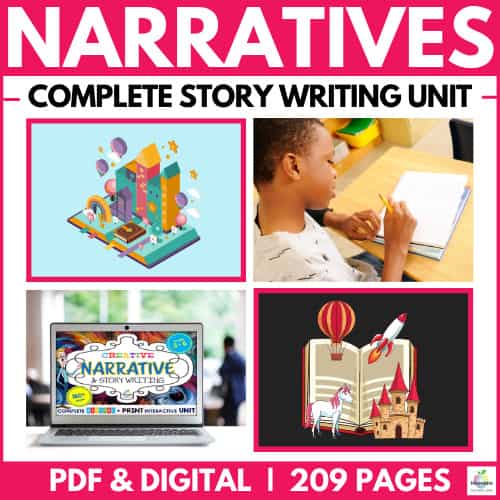
Teach your students to become skilled story writers with this HUGE NARRATIVE & CREATIVE STORY WRITING UNIT . Offering a COMPLETE SOLUTION to teaching students how to craft CREATIVE CHARACTERS, SUPERB SETTINGS, and PERFECT PLOTS .
Over 192 PAGES of materials, including:
TYPES OF NARRATIVE WRITING
There are many narrative writing genres and sub-genres such as these.
We have a complete guide to writing a personal narrative that differs from the traditional story-based narrative covered in this guide. It includes personal narrative writing prompts, resources, and examples and can be found here.

As we can see, narratives are an open-ended form of writing that allows you to showcase creativity in many directions. However, all narratives share a common set of features and structure known as “Story Elements”, which are briefly covered in this guide.
Don’t overlook the importance of understanding story elements and the value this adds to you as a writer who can dissect and create grand narratives. We also have an in-depth guide to understanding story elements here .
CHARACTERISTICS OF NARRATIVE WRITING
Narrative structure.
ORIENTATION (BEGINNING) Set the scene by introducing your characters, setting and time of the story. Establish your who, when and where in this part of your narrative
COMPLICATION AND EVENTS (MIDDLE) In this section activities and events involving your main characters are expanded upon. These events are written in a cohesive and fluent sequence.
RESOLUTION (ENDING) Your complication is resolved in this section. It does not have to be a happy outcome, however.
EXTRAS: Whilst orientation, complication and resolution are the agreed norms for a narrative, there are numerous examples of popular texts that did not explicitly follow this path exactly.

NARRATIVE FEATURES
LANGUAGE: Use descriptive and figurative language to paint images inside your audience’s minds as they read.
PERSPECTIVE Narratives can be written from any perspective but are most commonly written in first or third person.
DIALOGUE Narratives frequently switch from narrator to first-person dialogue. Always use speech marks when writing dialogue.
TENSE If you change tense, make it perfectly clear to your audience what is happening. Flashbacks might work well in your mind but make sure they translate to your audience.
THE PLOT MAP
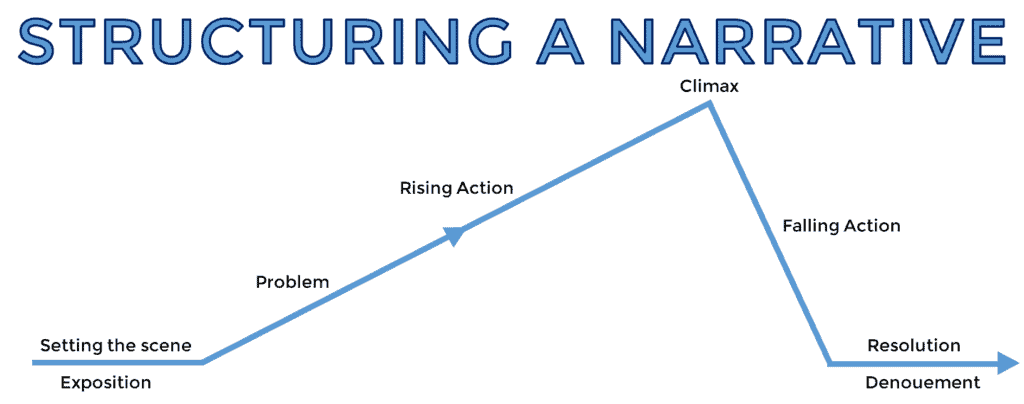
This graphic is known as a plot map, and nearly all narratives fit this structure in one way or another, whether romance novels, science fiction or otherwise.
It is a simple tool that helps you understand and organise a story’s events. Think of it as a roadmap that outlines the journey of your characters and the events that unfold. It outlines the different stops along the way, such as the introduction, rising action, climax, falling action, and resolution, that help you to see how the story builds and develops.
Using a plot map, you can see how each event fits into the larger picture and how the different parts of the story work together to create meaning. It’s a great way to visualize and analyze a story.
Be sure to refer to a plot map when planning a story, as it has all the essential elements of a great story.
THE 5 KEY STORY ELEMENTS OF A GREAT NARRATIVE (6-MINUTE TUTORIAL VIDEO)
This video we created provides an excellent overview of these elements and demonstrates them in action in stories we all know and love.
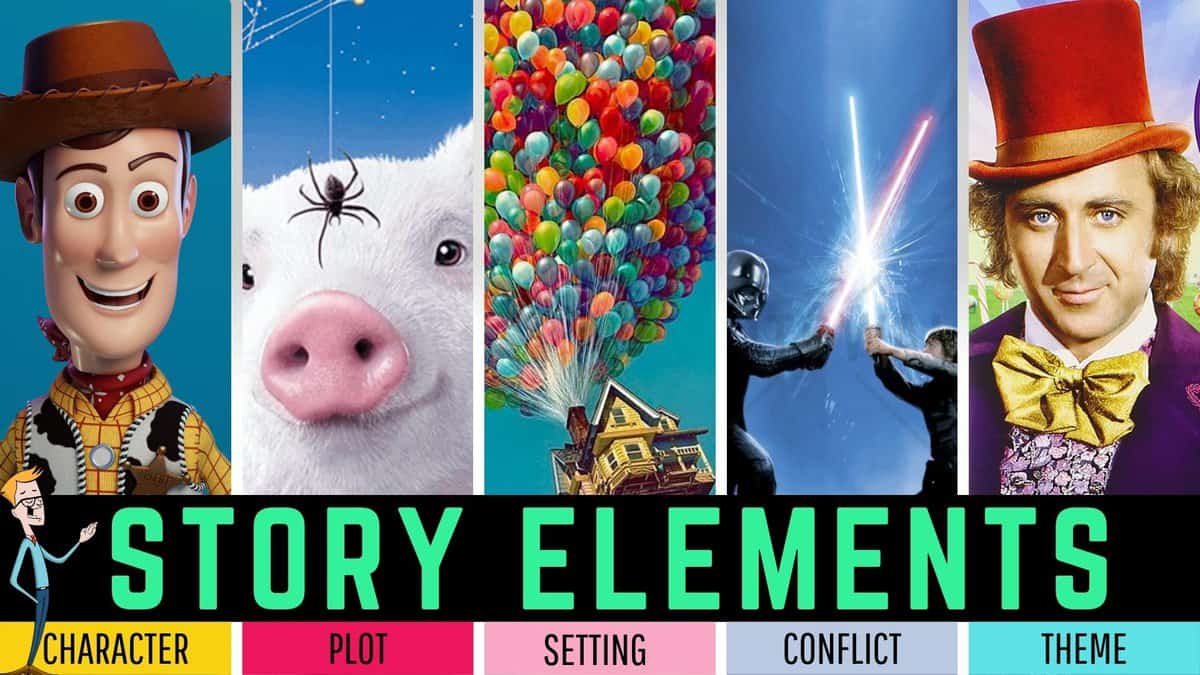
HOW TO WRITE A NARRATIVE

Now that we understand the story elements and how they come together to form stories, it’s time to start planning and writing your narrative.
In many cases, the template and guide below will provide enough details on how to craft a great story. However, if you still need assistance with the fundamentals of writing, such as sentence structure, paragraphs and using correct grammar, we have some excellent guides on those here.
USE YOUR WRITING TIME EFFECTIVELY: Maximize your narrative writing sessions by spending approximately 20 per cent of your time planning and preparing. This ensures greater productivity during your writing time and keeps you focused and on task.
Use tools such as graphic organizers to logically sequence your narrative if you are not a confident story writer. If you are working with reluctant writers, try using narrative writing prompts to get their creative juices flowing.
Spend most of your writing hour on the task at hand, don’t get too side-tracked editing during this time and leave some time for editing. When editing a narrative, examine it for these three elements.
- Spelling and grammar ( Is it readable?)
- Story structure and continuity ( Does it make sense, and does it flow? )
- Character and plot analysis. (Are your characters engaging? Does your problem/resolution work? )
1. SETTING THE SCENE: THE WHERE AND THE WHEN
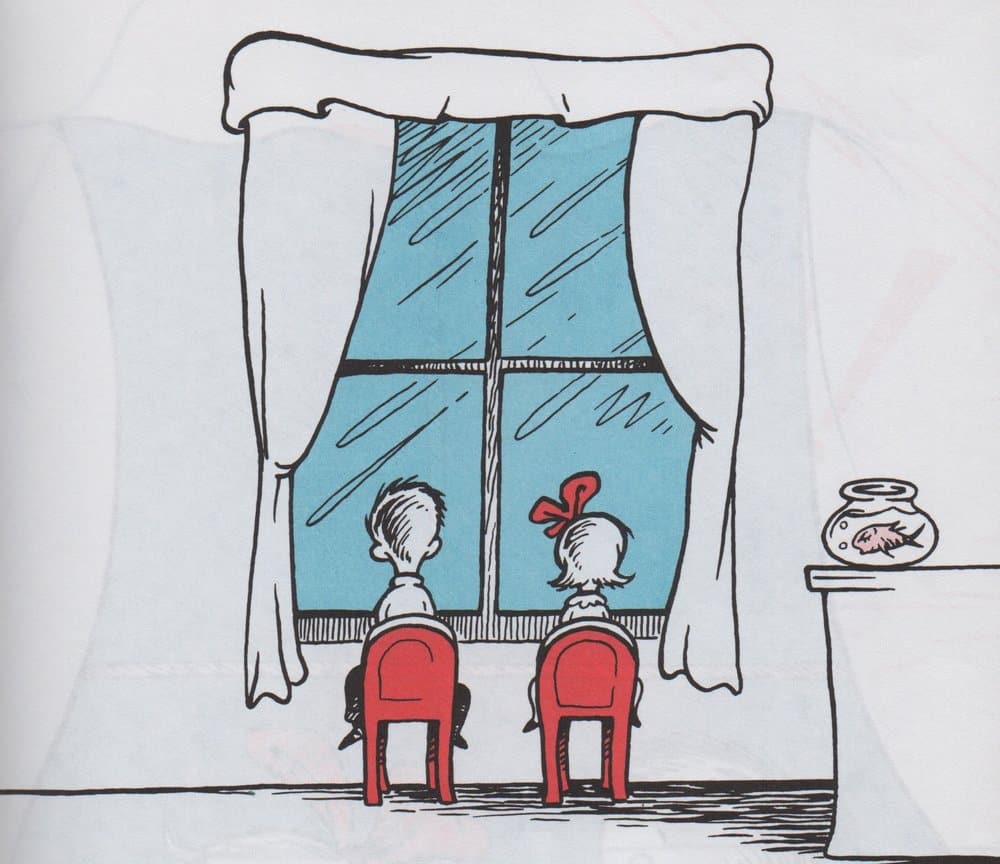
The story’s setting often answers two of the central questions in the story, namely, the where and the when. The answers to these two crucial questions will often be informed by the type of story the student is writing.
The story’s setting can be chosen to quickly orient the reader to the type of story they are reading. For example, a fictional narrative writing piece such as a horror story will often begin with a description of a haunted house on a hill or an abandoned asylum in the middle of the woods. If we start our story on a rocket ship hurtling through the cosmos on its space voyage to the Alpha Centauri star system, we can be reasonably sure that the story we are embarking on is a work of science fiction.
Such conventions are well-worn clichés true, but they can be helpful starting points for our novice novelists to make a start.
Having students choose an appropriate setting for the type of story they wish to write is an excellent exercise for our younger students. It leads naturally onto the next stage of story writing, which is creating suitable characters to populate this fictional world they have created. However, older or more advanced students may wish to play with the expectations of appropriate settings for their story. They may wish to do this for comic effect or in the interest of creating a more original story. For example, opening a story with a children’s birthday party does not usually set up the expectation of a horror story. Indeed, it may even lure the reader into a happy reverie as they remember their own happy birthday parties. This leaves them more vulnerable to the surprise element of the shocking action that lies ahead.
Once the students have chosen a setting for their story, they need to start writing. Little can be more terrifying to English students than the blank page and its bare whiteness stretching before them on the table like a merciless desert they must cross. Give them the kick-start they need by offering support through word banks or writing prompts. If the class is all writing a story based on the same theme, you may wish to compile a common word bank on the whiteboard as a prewriting activity. Write the central theme or genre in the middle of the board. Have students suggest words or phrases related to the theme and list them on the board.
You may wish to provide students with a copy of various writing prompts to get them started. While this may mean that many students’ stories will have the same beginning, they will most likely arrive at dramatically different endings via dramatically different routes.

A bargain is at the centre of the relationship between the writer and the reader. That bargain is that the reader promises to suspend their disbelief as long as the writer creates a consistent and convincing fictional reality. Creating a believable world for the fictional characters to inhabit requires the student to draw on convincing details. The best way of doing this is through writing that appeals to the senses. Have your student reflect deeply on the world that they are creating. What does it look like? Sound like? What does the food taste like there? How does it feel like to walk those imaginary streets, and what aromas beguile the nose as the main character winds their way through that conjured market?
Also, Consider the when; or the time period. Is it a future world where things are cleaner and more antiseptic? Or is it an overcrowded 16th-century London with human waste stinking up the streets? If students can create a multi-sensory installation in the reader’s mind, then they have done this part of their job well.
Popular Settings from Children’s Literature and Storytelling
- Fairytale Kingdom
- Magical Forest
- Village/town
- Underwater world
- Space/Alien planet
2. CASTING THE CHARACTERS: THE WHO
Now that your student has created a believable world, it is time to populate it with believable characters.
In short stories, these worlds mustn’t be overpopulated beyond what the student’s skill level can manage. Short stories usually only require one main character and a few secondary ones. Think of the short story more as a small-scale dramatic production in an intimate local theater than a Hollywood blockbuster on a grand scale. Too many characters will only confuse and become unwieldy with a canvas this size. Keep it simple!
Creating believable characters is often one of the most challenging aspects of narrative writing for students. Fortunately, we can do a few things to help students here. Sometimes it is helpful for students to model their characters on actual people they know. This can make things a little less daunting and taxing on the imagination. However, whether or not this is the case, writing brief background bios or descriptions of characters’ physical personality characteristics can be a beneficial prewriting activity. Students should give some in-depth consideration to the details of who their character is: How do they walk? What do they look like? Do they have any distinguishing features? A crooked nose? A limp? Bad breath? Small details such as these bring life and, therefore, believability to characters. Students can even cut pictures from magazines to put a face to their character and allow their imaginations to fill in the rest of the details.
Younger students will often dictate to the reader the nature of their characters. To improve their writing craft, students must know when to switch from story-telling mode to story-showing mode. This is particularly true when it comes to character. Encourage students to reveal their character’s personality through what they do rather than merely by lecturing the reader on the faults and virtues of the character’s personality. It might be a small relayed detail in the way they walk that reveals a core characteristic. For example, a character who walks with their head hanging low and shoulders hunched while avoiding eye contact has been revealed to be timid without the word once being mentioned. This is a much more artistic and well-crafted way of doing things and is less irritating for the reader. A character who sits down at the family dinner table immediately snatches up his fork and starts stuffing roast potatoes into his mouth before anyone else has even managed to sit down has revealed a tendency towards greed or gluttony.
Understanding Character Traits
Again, there is room here for some fun and profitable prewriting activities. Give students a list of character traits and have them describe a character doing something that reveals that trait without ever employing the word itself.
It is also essential to avoid adjective stuffing here. When looking at students’ early drafts, adjective stuffing is often apparent. To train the student out of this habit, choose an adjective and have the student rewrite the sentence to express this adjective through action rather than telling.
When writing a story, it is vital to consider the character’s traits and how they will impact the story’s events. For example, a character with a strong trait of determination may be more likely to overcome obstacles and persevere. In contrast, a character with a tendency towards laziness may struggle to achieve their goals. In short, character traits add realism, depth, and meaning to a story, making it more engaging and memorable for the reader.
Popular Character Traits in Children’s Stories
- Determination
- Imagination
- Perseverance
- Responsibility
We have an in-depth guide to creating great characters here , but most students should be fine to move on to planning their conflict and resolution.
3. NO PROBLEM? NO STORY! HOW CONFLICT DRIVES A NARRATIVE

This is often the area apprentice writers have the most difficulty with. Students must understand that without a problem or conflict, there is no story. The problem is the driving force of the action. Usually, in a short story, the problem will center around what the primary character wants to happen or, indeed, wants not to happen. It is the hurdle that must be overcome. It is in the struggle to overcome this hurdle that events happen.
Often when a student understands the need for a problem in a story, their completed work will still not be successful. This is because, often in life, problems remain unsolved. Hurdles are not always successfully overcome. Students pick up on this.
We often discuss problems with friends that will never be satisfactorily resolved one way or the other, and we accept this as a part of life. This is not usually the case with writing a story. Whether a character successfully overcomes his or her problem or is decidedly crushed in the process of trying is not as important as the fact that it will finally be resolved one way or the other.
A good practical exercise for students to get to grips with this is to provide copies of stories and have them identify the central problem or conflict in each through discussion. Familiar fables or fairy tales such as Three Little Pigs, The Boy Who Cried Wolf, Cinderella, etc., are great for this.
While it is true that stories often have more than one problem or that the hero or heroine is unsuccessful in their first attempt to solve a central problem, for beginning students and intermediate students, it is best to focus on a single problem, especially given the scope of story writing at this level. Over time students will develop their abilities to handle more complex plots and write accordingly.
Popular Conflicts found in Children’s Storytelling.
- Good vs evil
- Individual vs society
- Nature vs nurture
- Self vs others
- Man vs self
- Man vs nature
- Man vs technology
- Individual vs fate
- Self vs destiny
Conflict is the heart and soul of any good story. It’s what makes a story compelling and drives the plot forward. Without conflict, there is no story. Every great story has a struggle or a problem that needs to be solved, and that’s where conflict comes in. Conflict is what makes a story exciting and keeps the reader engaged. It creates tension and suspense and makes the reader care about the outcome.
Like in real life, conflict in a story is an opportunity for a character’s growth and transformation. It’s a chance for them to learn and evolve, making a story great. So next time stories are written in the classroom, remember that conflict is an essential ingredient, and without it, your story will lack the energy, excitement, and meaning that makes it truly memorable.
4. THE NARRATIVE CLIMAX: HOW THINGS COME TO A HEAD!

The climax of the story is the dramatic high point of the action. It is also when the struggles kicked off by the problem come to a head. The climax will ultimately decide whether the story will have a happy or tragic ending. In the climax, two opposing forces duke things out until the bitter (or sweet!) end. One force ultimately emerges triumphant. As the action builds throughout the story, suspense increases as the reader wonders which of these forces will win out. The climax is the release of this suspense.
Much of the success of the climax depends on how well the other elements of the story have been achieved. If the student has created a well-drawn and believable character that the reader can identify with and feel for, then the climax will be more powerful.
The nature of the problem is also essential as it determines what’s at stake in the climax. The problem must matter dearly to the main character if it matters at all to the reader.
Have students engage in discussions about their favorite movies and books. Have them think about the storyline and decide the most exciting parts. What was at stake at these moments? What happened in your body as you read or watched? Did you breathe faster? Or grip the cushion hard? Did your heart rate increase, or did you start to sweat? This is what a good climax does and what our students should strive to do in their stories.
The climax puts it all on the line and rolls the dice. Let the chips fall where the writer may…
Popular Climax themes in Children’s Stories
- A battle between good and evil
- The character’s bravery saves the day
- Character faces their fears and overcomes them
- The character solves a mystery or puzzle.
- The character stands up for what is right.
- Character reaches their goal or dream.
- The character learns a valuable lesson.
- The character makes a selfless sacrifice.
- The character makes a difficult decision.
- The character reunites with loved ones or finds true friendship.
5. RESOLUTION: TYING UP LOOSE ENDS
After the climactic action, a few questions will often remain unresolved for the reader, even if all the conflict has been resolved. The resolution is where those lingering questions will be answered. The resolution in a short story may only be a brief paragraph or two. But, in most cases, it will still be necessary to include an ending immediately after the climax can feel too abrupt and leave the reader feeling unfulfilled.
An easy way to explain resolution to students struggling to grasp the concept is to point to the traditional resolution of fairy tales, the “And they all lived happily ever after” ending. This weather forecast for the future allows the reader to take their leave. Have the student consider the emotions they want to leave the reader with when crafting their resolution.
While the action is usually complete by the end of the climax, it is in the resolution that if there is a twist to be found, it will appear – think of movies such as The Usual Suspects. Pulling this off convincingly usually requires considerable skill from a student writer. Still, it may well form a challenging extension exercise for those more gifted storytellers among your students.
Popular Resolutions in Children’s Stories
- Our hero achieves their goal
- The character learns a valuable lesson
- A character finds happiness or inner peace.
- The character reunites with loved ones.
- Character restores balance to the world.
- The character discovers their true identity.
- Character changes for the better.
- The character gains wisdom or understanding.
- Character makes amends with others.
- The character learns to appreciate what they have.
Once students have completed their story, they can edit for grammar, vocabulary choice, spelling, etc., but not before!
As mentioned, there is a craft to storytelling, as well as an art. When accurate grammar, perfect spelling, and immaculate sentence structures are pushed at the outset, they can cause storytelling paralysis. For this reason, it is essential that when we encourage the students to write a story, we give them license to make mechanical mistakes in their use of language that they can work on and fix later.
Good narrative writing is a very complex skill to develop and will take the student years to become competent. It challenges not only the student’s technical abilities with language but also her creative faculties. Writing frames, word banks, mind maps, and visual prompts can all give valuable support as students develop the wide-ranging and challenging skills required to produce a successful narrative writing piece. But, at the end of it all, as with any craft, practice and more practice is at the heart of the matter.
TIPS FOR WRITING A GREAT NARRATIVE
- Start your story with a clear purpose: If you can determine the theme or message you want to convey in your narrative before starting it will make the writing process so much simpler.
- Choose a compelling storyline and sell it through great characters, setting and plot: Consider a unique or interesting story that captures the reader’s attention, then build the world and characters around it.
- Develop vivid characters that are not all the same: Make your characters relatable and memorable by giving them distinct personalities and traits you can draw upon in the plot.
- Use descriptive language to hook your audience into your story: Use sensory language to paint vivid images and sequences in the reader’s mind.
- Show, don’t tell your audience: Use actions, thoughts, and dialogue to reveal character motivations and emotions through storytelling.
- Create a vivid setting that is clear to your audience before getting too far into the plot: Describe the time and place of your story to immerse the reader fully.
- Build tension: Refer to the story map earlier in this article and use conflict, obstacles, and suspense to keep the audience engaged and invested in your narrative.
- Use figurative language such as metaphors, similes, and other literary devices to add depth and meaning to your narrative.
- Edit, revise, and refine: Take the time to refine and polish your writing for clarity and impact.
- Stay true to your voice: Maintain your unique perspective and style in your writing to make it your own.
NARRATIVE WRITING EXAMPLES (Student Writing Samples)
Below are a collection of student writing samples of narratives. Click on the image to enlarge and explore them in greater detail. Please take a moment to read these creative stories in detail and the teacher and student guides which highlight some of the critical elements of narratives to consider before writing.
Please understand these student writing samples are not intended to be perfect examples for each age or grade level but a piece of writing for students and teachers to explore together to critically analyze to improve student writing skills and deepen their understanding of story writing.
We recommend reading the example either a year above or below, as well as the grade you are currently working with, to gain a broader appreciation of this text type.
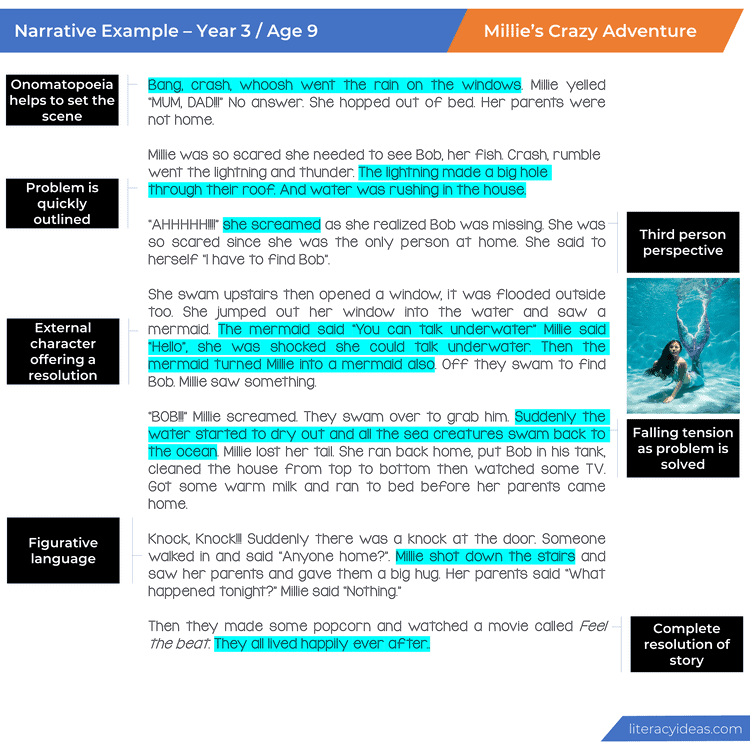
NARRATIVE WRITING PROMPTS (Journal Prompts)
When students have a great journal prompt, it can help them focus on the task at hand, so be sure to view our vast collection of visual writing prompts for various text types here or use some of these.
- On a recent European trip, you find your travel group booked into the stunning and mysterious Castle Frankenfurter for a single night… As night falls, the massive castle of over one hundred rooms seems to creak and groan as a series of unexplained events begin to make you wonder who or what else is spending the evening with you. Write a narrative that tells the story of your evening.
- You are a famous adventurer who has discovered new lands; keep a travel log over a period of time in which you encounter new and exciting adventures and challenges to overcome. Ensure your travel journal tells a story and has a definite introduction, conflict and resolution.
- You create an incredible piece of technology that has the capacity to change the world. As you sit back and marvel at your innovation and the endless possibilities ahead of you, it becomes apparent there are a few problems you didn’t really consider. You might not even be able to control them. Write a narrative in which you ride the highs and lows of your world-changing creation with a clear introduction, conflict and resolution.
- As the final door shuts on the Megamall, you realise you have done it… You and your best friend have managed to sneak into the largest shopping centre in town and have the entire place to yourselves until 7 am tomorrow. There is literally everything and anything a child would dream of entertaining themselves for the next 12 hours. What amazing adventures await you? What might go wrong? And how will you get out of there scot-free?
- A stranger walks into town… Whilst appearing similar to almost all those around you, you get a sense that this person is from another time, space or dimension… Are they friends or foes? What makes you sense something very strange is going on? Suddenly they stand up and walk toward you with purpose extending their hand… It’s almost as if they were reading your mind.
NARRATIVE WRITING VIDEO TUTORIAL

Teaching Resources
Use our resources and tools to improve your student’s writing skills through proven teaching strategies.
When teaching narrative writing, it is essential that you have a range of tools, strategies and resources at your disposal to ensure you get the most out of your writing time. You can find some examples below, which are free and paid premium resources you can use instantly without any preparation.
FREE Narrative Graphic Organizer
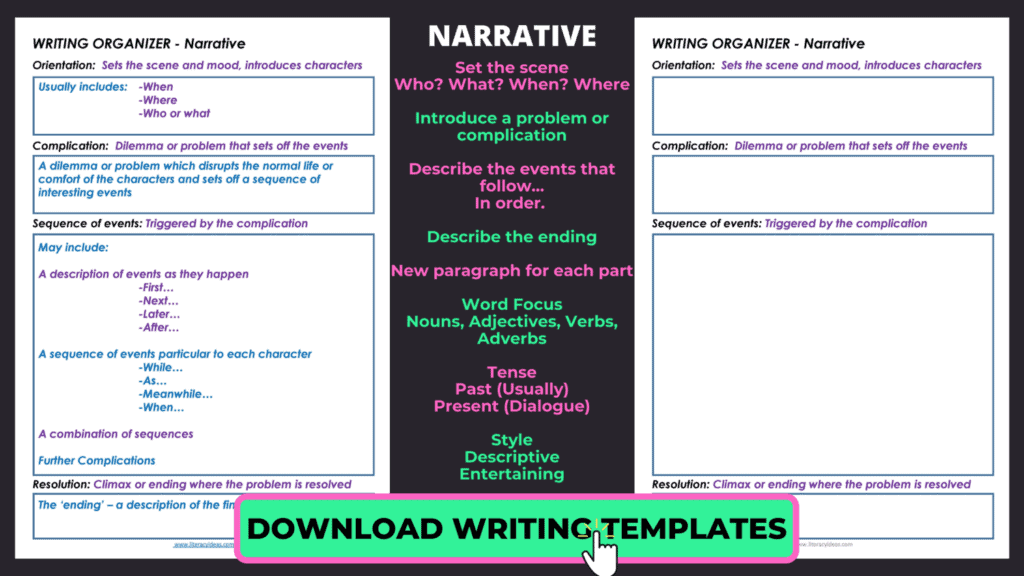
THE STORY TELLERS BUNDLE OF TEACHING RESOURCES
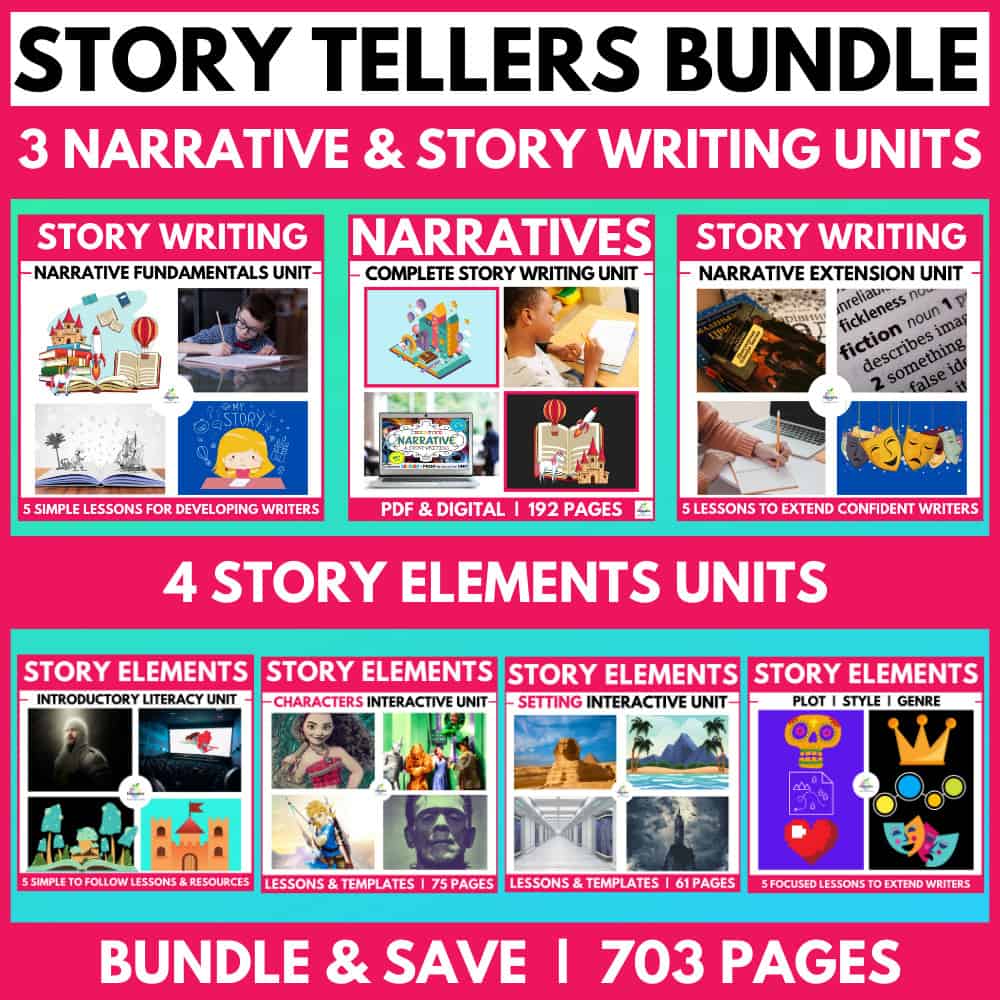
A MASSIVE COLLECTION of resources for narratives and story writing in the classroom covering all elements of crafting amazing stories. MONTHS WORTH OF WRITING LESSONS AND RESOURCES, including:
NARRATIVE WRITING CHECKLIST BUNDLE

⭐⭐⭐⭐⭐ (92 Reviews)
OTHER GREAT ARTICLES ABOUT NARRATIVE WRITING

Narrative Writing for Kids: Essential Skills and Strategies

7 Great Narrative Lesson Plans Students and Teachers Love
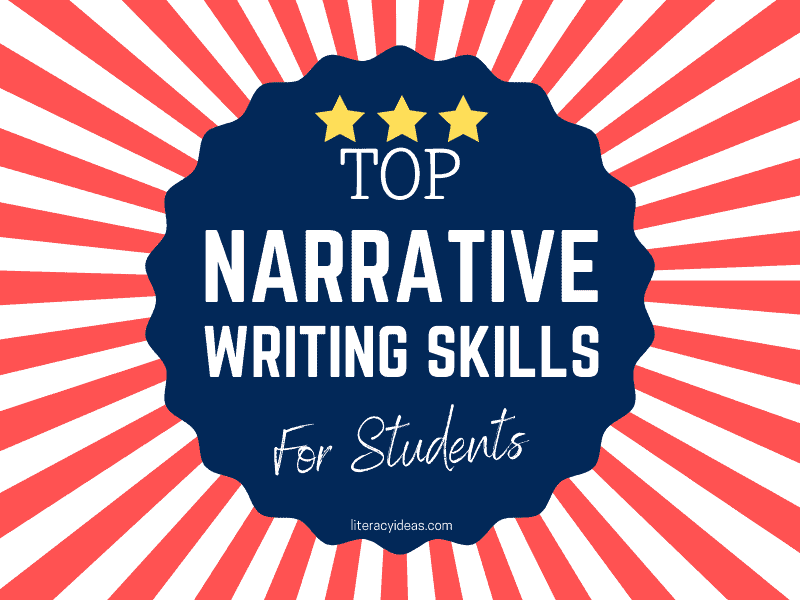
Top 7 Narrative Writing Exercises for Students
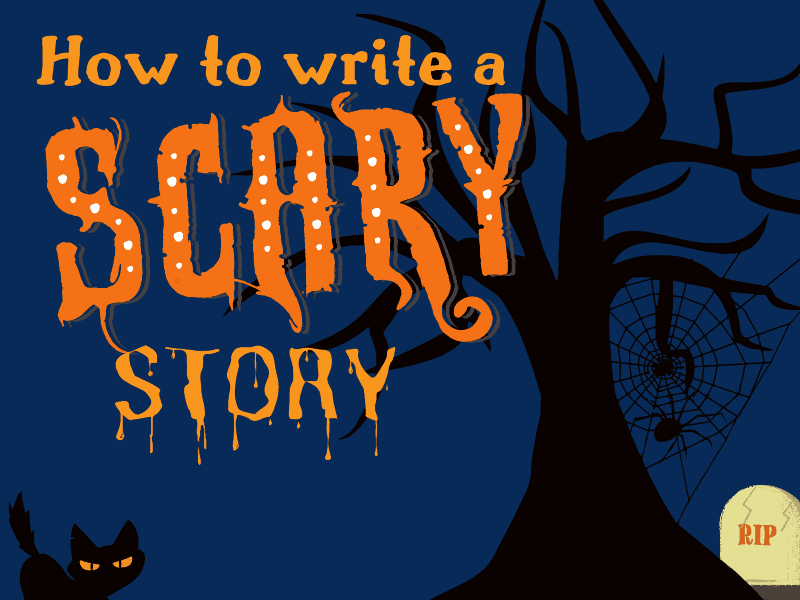
How to Write a Scary Story

Choose Your Test
Sat / act prep online guides and tips, how to come up with great college essay ideas.
College Essays
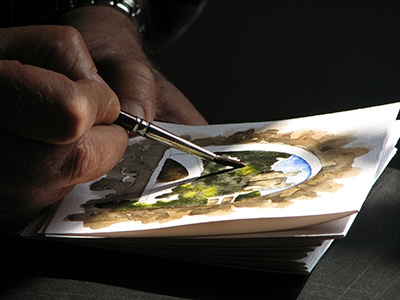
Writing the college application essay is a tough gig. You've got to be charming, personal, memorable, and insightful--all in under two pages! But I'm going to tell you a secret: half of a great personal essay is a great topic idea. If you're passionate about what you're writing, and if you're truly documenting something meaningful and serious about yourself and your life, then that passion and meaning will come alive on the page and in the mind of your reader.
So how do you come up with an essay idea? The best way is to brainstorm your way to an event from your life that reveals a core truth about you. In this article, I will help you do just that. Keep reading to find 35 jumping off points that touch on every possible memory you could harness, as well as advice on how to use your brainstorming session to fully realize your idea for an essay topic.
What Makes an Essay Topic Great?
What does your application tell admissions officers about you? Mostly it's just numbers and facts: your name, your high school, your grades and SAT scores. These stats would be enough if colleges were looking to build a robot army, but they aren't.
So how do they get to see a slice of the real you? How can they get a feel for the personality, character, and feelings that make you the person that you are? It's through your college essay. The essay is a way to introduce yourself to colleges in a way that displays your maturity. This is important because admissions officers want to make sure that you will thrive in the independence of college life and work.
This is why finding a great college essay topic is so hugely important: because it will allow you to demonstrate the maturity level admissions teams are looking for. This is best expressed through the ability to have insight about what has made you into you, through the ability to share some vulnerabilities or defining experiences, and through the ability to be a creative thinker and problem solver.
In other words, a great topic is an event from your past that you can narrate, draw conclusions from, explain the effect of. Most importantly, you should be able to describe how it has changed you from the kind of person you were to the better person that you are now. If you can do all that, you are well ahead of the essay game.
How Do You Know If Your College Essay Topic Is Great?
Eric Maloof, the Director of International Admission at Trinity University in San Antonio, Texas has a great checklist for figuring out whether you're on the right track with your essay topic . He says, if you can answer "yes" to these two questions, then you've got the makings of a great essay:
- Is the topic of my essay important to me?
- Am I the only person who could have written this essay?
So how do you translate this checklist into essay topic action items?
Make it personal. Write about something personal, deeply felt, and authentic to the real you (but which is not an overshare). Take a narrow slice of your life: one event, one influential person, one meaningful experience—and then you expand out from that slice into a broader explanation of yourself.
Always think about your reader. In this case, your reader is an admission officer who is slogging through hundreds of college essays. You don't want to bore that person, and you don't want to offend that person. Instead, you want to come across as likable and memorable.
Put the reader in the experience with you by making your narrow slice of life feel alive. This means that your writing needs to be chock-full of specific details, sensory descriptions, words that describe emotions, and maybe even dialog. This is why it's very important to make the essay topic personal and deeply felt. Readers can tell when a writer isn't really connected to whatever he is writing about. And the reverse is true as well: deep emotion shows through your writing.

Coming Up With Great College Essay Ideas
Some people know right off the bat that they have to write about that one specific defining moment of their lives. But if you're reading this, chances are you aren't one of these people. Don't worry—I wasn't one of them either! What this means is that you—like me—will have to put in a little work to come up with the perfect idea by first doing some brainstorming.
I've come up with about 35 different brainstorming jumping off points that ask questions about your life and your experiences. The idea here is to jog your memory about the key life events that have shaped you and affected you deeply.
I recommend you spend at least two minutes on each question, coming up with and writing down at least one answer—or as many answers as you can think of. Seriously—time yourself. Two minutes is longer than you think! I would also recommend doing this over several sittings to get your maximum memory retrieval going—even if it takes a couple of days, it'll be worth it.
Then, we will use this list of experiences and thoughts to narrow your choices down to the one topic idea that you will use for your college essay.
Brainstorming Technique 1: Think About Defining Moments in Your Life
- What is your happiest memory? Why? What was good about it? Who and what was around you then? What did it mean to you?
- What is your saddest memory? Would you change the thing that happened or did you learn something crucial from the experience?
- What is the most important decision you've had to make? What was hard about the choice? What was easy? Were the consequences of your decision what you had imagined before making it? Did you plan and game out your choices, or did you follow gut instinct?
- What decision did you not have any say in, but would have wanted to? Why were you powerless to participate in this decision? How did the choice made affect you? What do you think would have happened if a different choice had been made?
- What the most dangerous or scary thing that you've lived through? What was threatened? What were the stakes? How did you survive/overcome it? How did you cope emotionally with the fallout?
- When did you first feel like you were no longer a child? Who and what was around you then? What had you just done or seen? What was the difference between your childhood self and your more adult self?
- What are you most proud of about yourself? Is it a talent or skill? A personality trait or quality? An accomplishment? Why is this the thing that makes you proud?

Brainstorming Technique 2: Remember Influential People
- Which of your parents (or parental figures) are you most like in personality and character? Which of their traits do you see in yourself? Which do you not? Do you wish you were more like this parent or less?
- Which of your grandparents, great-grandparents, or other older relatives has had the most influence on your life? Is it a positive influence, where you want to follow in their footsteps in some way? A negative influence, where you want to avoid becoming like them in some way? How is the world they come from like your world? How is it different?
- Which teacher has challenged you the most? What has that challenge been? How did you respond?
- What is something that someone once said to you that has stuck with you? When and where did they say it? Why do you think it's lodged in your memory?
- Which of your friends would you trade places with for a day? Why?
- If you could intern for a week or a month with anyone—living or dead, historical or fictional—who would it be? What would you want that person to teach you? How did you first encounter this person or character? How do you think this person would react to you?
- Of the people you know personally, whose life is harder than yours? What makes it that way—their external circumstances? Their inner state? Have you ever tried to help this person? If yes, did it work? If no, how would you help them if you could?
- Of the people you know personally, whose life is easier than yours? Are you jealous? Why or why not?

Brainstorming Technique 3: Recreate Important Times or Places
- When is the last time you felt so immersed in what you were doing that you lost all track of time or anything else from the outside world? What were you doing? Why do you think this activity got you into this near-zen state?
- Where do you most often tend to daydream? Why do you think this place has this effect on you? Do you seek it out? Avoid it? Why?
- What is the best time of day? The worst? Why?
- What is your favorite corner of, or space in, the place where you live? What do you like about it? When do you go there, and what do you use it for?
- What is your least favorite corner of, or space in, the place where you live? Why do you dislike it? What do you associate it with?
- If you had to repeat a day over and over, like the movie Groundhog Day , what day would it be? If you'd pick a day from your life that has already happened, why would you want to be stuck it in? To relive something great? To fix mistakes? If you'd pick a day that hasn't yet occurred, what would the day you were stuck in be like?
- If you could go back in time to give yourself advice, when would you go back to? What advice would you give? Why? What effect would you want your advice to have?

Brainstorming Technique 4: Answer Thought-Provoking Questions
- If you could take a Mulligan and do over one thing in your life, what would it be? Would you change what you did the first time around? Why?
- Or, if you could take another crack at doing something again, what would you pick? Something positive—having another shot at repeating a good experience? Something negative—getting the chance to try another tactic to avoid a bad experience?
- Which piece of yourself could you never change while remaining the same person? Your race? Ethnicity? Intellect? Height? Freckles? Loyalty? Sense of humor? Why is that the thing that you'd cling to as the thing that makes you who you are?
- Which of your beliefs, ideas, or tastes puts you in the minority? Why do you think/believe/like this thing when no one else seems to?
- What are you most frightened of? What are you not frightened enough of? Why?
- What is your most treasured possession? What would you grab before running out of the house during a fire? What is this object's story and why is it so valuable to you?
- What skill or talent that you don't have now would you most like to have? Is it an extension of something you already do? Something you've never had the guts to try doing? Something you plan on learning in the future?
- Which traditions that you grew up with will you pass on? Which will you ignore? Why?

Brainstorming Technique 5: Find a Trait or Characteristic and Trace It Back
- What are three adjectives you'd use to describe yourself? Why these three? Which of these is the one you're most proud of? Least proud of? When did you last exhibit this trait? What were you doing?
- How would your best friend describe you? What about your parents? How are the adjectives they'd come up with different from the ones you'd use? When have they seen this quality or trait in you?
- What everyday thing are you the world's greatest at? Who taught you how to do it? What memories do you have associated with this activity? Which aspects of it have you perfected?
- Imagine that it's the future and that you've become well known. What will you become famous for? Is it for something creative or a performance? For the way you will have helped others? For your business accomplishments? For your athletic prowess? When you make a speech about this fame, whom will you thank for putting you where you are?
- What do you most like about yourself? This is different from the thing you're most proud of—this is the thing that you know about yourself that makes you smile. Can you describe a time when this thing was useful or effective in some way?

How to Turn Your Brainstorming List Into an Essay Topic
Now that you have a cornucopia of daydreams, memories, thoughts, and ambitions, it's time to thin the herd, prune the dead branches, and whatever other mixed metaphors about separating the wheat from the chaff you can think of.
So how do you narrow down your many ideas into one?
Use the magic power of time. One of the best things you can do with your stack of college essay topics is to forget about them. Put them away for a couple of days so that you create a little mental space. When you come back to everything you wrote after a day or two, you will get the chance to read it with fresh eyes.
Let the cream rise to the top. When you reread your topics after having let them sit, do two things:
- Cross out any ideas that don't speak to you in some way. If something doesn't ring true, if it doesn't spark your interest, or if it doesn't connect with an emotion, then consider reject it.
- Circle or highlight any topics that pop out at you. If it feels engaging, if you get excited at the prospect of talking about it, if it resonates with a feeling, then put it at the top of the idea pile.
Rinse and repeat. Go through the process of letting a few days pass and then rereading your ideas at least one more time. This time, don't bother looking at the topics you've already rejected. Instead, concentrate on those you highlighted earlier and maybe some of the ones that were neither circled nor thrown away.
Trust your gut instinct (but verify). Now that you've gone through and culled your ideas several times based on whether or not they really truly appeal to you, you should have a list of your top choices—all the ones you've circled or highlighted along the way. Now is the moment of truth. Imagine yourself telling the story of each of these experiences to someone who wants to get to know you. Rank your possible topics in order of how excited you are to share this story. Really listen to your intuition here. If you're squeamish, shy, unexcited, or otherwise not happy at the thought of having to tell someone about the experience, it will make a terrible essay topic.
Develop your top two to four choices to see which is best. Unless you feel very strongly about one of your top choices, the only way to really know which of your best ideas is the perfect one is to try actually making them into essays. For each one, go through the steps listed in the next section of the article under "Find Your Idea's Narrative." Then, use your best judgment (and maybe that of your parents, teachers, or school counselor) to figure out which one to draft into your personal statement.

How to Make Your Idea Into a College Essay
Now, let's talk about what to do in order to flesh out your topic concept into a great college essay. First, I'll give you some pointers on expanding your idea into an essay-worthy story, and then talk a bit about how to draft and polish your personal statement.
Find Your Topic's Narrative
All great college essays have the same foundation as good short stories or enjoyable movies—an involving story. Let's go through what features make for a story that you don't want to put down:
A compelling character with an arc. Think about the experience that you want to write about. What were you like before it happened? What did you learn, feel, or think about during it? What happened afterwards? What do you now know about yourself that you didn't before?
Sensory details that create a "you are there!" experience for the reader. When you're writing about your experience, focus on trying to really make the situation come alive. Where were you? Who else was there? What did it look like? What did it sound like? Were there memorable textures, smells, tastes? Does it compare to anything else? When you're writing about the people you interacted with, give them a small snippet of dialog to say so the reader can "hear" that person's voice. When you are writing about yourself, make sure to include words that explain the emotions you are feeling at different parts of the story.
An insightful ending. Your essay should end with an uplifting, personal, and interesting revelation about the kind of person you are today, and how the story you have just described has made and shaped you.
Draft and Revise
The key to great writing is rewriting. So work out a draft, and then put it aside and give yourself a few days to forget what you've written. When you come back to look at it again look for places where you slow down your reading, where something seems out of place or awkward. Can you fix this by changing around the order of your essay? By explaining further? By adding details? Experiment.
Get advice. Colleges expect your essay to be your work, but most recommend having someone else cast a fresh eye over it. A good way to get a teacher or a parent involved is to ask them whether your story is clear and specific, and whether your insight about yourself flows logically from the story you tell.
Execute flawlessly. Dot every i, cross every t, delicately place every comma where it needs to go. Grammar mistakes, misspellings, and awkward sentence structure don't just make your writing look bad—they take the reader out of the story you're telling. And that makes you memorable, but in a bad way.

The Bottom Line
- Your college essay topic needs to come from the fact that essays are a way for colleges to get to know the real you , a you that is separate from your grades and scores.
- A great way to come up with topics is to wholeheartedly dive into a brainstorming exercise. The more ideas about your life that tumble out of your memory and onto the page, the better chance you have of finding the perfect college essay topic.
- Answer my brainstorming questions without editing yourself at first. Instead, simply write down as many things that pop into your head as you can—even if you end up going off topic.
- After you've generated a list of possible topics, leave it alone for a few days and then come back to pick out the ones that seem the most promising.
- Flesh out your top few ideas into full-blown narratives , to understand which reveals the most interesting thing about you as a person.
- Don't shy away from asking for help. At each stage of the writing process get a parent or teacher to look over what you're working on, not to do your work for you but to hopefully gently steer you in a better direction if you're running into trouble.
What's Next?
Ready to start working on your essay? Check out our explanation of the point of the personal essay and the role it plays on your applications .
For more detailed advice on writing a great college essay, read our guide to the Common Application essay prompts and get advice on how to pick the Common App prompt that's right for you .
Thinking of taking the SAT again before submitting your applications? We have put together the ultimate guide to studying for the SAT to give you the ins and outs of the best ways to study.

Anna scored in the 99th percentile on her SATs in high school, and went on to major in English at Princeton and to get her doctorate in English Literature at Columbia. She is passionate about improving student access to higher education.
Ask a Question Below
Have any questions about this article or other topics? Ask below and we'll reply!
Improve With Our Famous Guides
- For All Students
The 5 Strategies You Must Be Using to Improve 160+ SAT Points
How to Get a Perfect 1600, by a Perfect Scorer
Series: How to Get 800 on Each SAT Section:
Score 800 on SAT Math
Score 800 on SAT Reading
Score 800 on SAT Writing
Series: How to Get to 600 on Each SAT Section:
Score 600 on SAT Math
Score 600 on SAT Reading
Score 600 on SAT Writing
Free Complete Official SAT Practice Tests
What SAT Target Score Should You Be Aiming For?
15 Strategies to Improve Your SAT Essay
The 5 Strategies You Must Be Using to Improve 4+ ACT Points
How to Get a Perfect 36 ACT, by a Perfect Scorer
Series: How to Get 36 on Each ACT Section:
36 on ACT English
36 on ACT Math
36 on ACT Reading
36 on ACT Science
Series: How to Get to 24 on Each ACT Section:
24 on ACT English
24 on ACT Math
24 on ACT Reading
24 on ACT Science
What ACT target score should you be aiming for?
ACT Vocabulary You Must Know
ACT Writing: 15 Tips to Raise Your Essay Score
How to Get Into Harvard and the Ivy League
How to Get a Perfect 4.0 GPA
How to Write an Amazing College Essay
What Exactly Are Colleges Looking For?
Is the ACT easier than the SAT? A Comprehensive Guide
Should you retake your SAT or ACT?
When should you take the SAT or ACT?
Stay Informed
Get the latest articles and test prep tips!
Looking for Graduate School Test Prep?
Check out our top-rated graduate blogs here:
GRE Online Prep Blog
GMAT Online Prep Blog
TOEFL Online Prep Blog
Holly R. "I am absolutely overjoyed and cannot thank you enough for helping me!”
✍️ 200+ Short Story Ideas (and How to Come Up With Your Own)
Are you ready to write but don’t know what to write about? Prepare to kick your writing into gear by browsing through our list of 200+ short story ideas. New prompts are added each week, and you can search by genre. But don’t let our categories stop you from putting your own spin on a writing prompt: if you find a short story idea tagged as sci-fi, but you think it would make a great romance plot, run with it! For tips on how to come up with your own story ideas, scroll to the bottom of the page.
We found 539 stories that match your search 🔦
A character who loves reading finds out that their library has just been forbidden from carrying banned books.
A character doesn't know how to break up with their partner, and keeps putting it off until the very moment that the partner bends down on one knee and proposes., subscribe to our prompts newsletter.
Curated writing inspriation delivered to your inbox each week.
One character wants a snake, but their roommate has a phobia. They adopt one anyway.
For years, four characters have met for a monthly card game. write a story in which one character realizes that another is cheating., you visited a psychic for romantic advice. instead, they tell you that your spouse has a secret., a character doesn't know how to ask their parent to stop calling them 2+ times a day., a pair of best friends realize they're two corners of a love triangle — they both have feelings for the same person., top 10 story ideas... just for you.
Want a story idea right away? No problem! Here are our top ten favorite story ideas for you to use:
- A group of villains go on a team-building retreat.
- You are granted one wish. But you have to use the wish for someone else.
- Instead of trying to get a man on the moon, every nation raced to be the first at the very bottom of the ocean.
- Money really does grow on trees and is heavily regulated by governments.
- A plane takes off with 81 passengers. It lands with 82.
- You are home alone watching TV. A character dials a number on their phone. Your phone rings.
- You open a fortune cookie at a Chinese restaurant. Inside is a handwritten note.
- A magician, a troll, and a college student walk into a bar.
- It is the year 3000. The sun starts to flicker.
- An optimist becomes a pessimist. Why?
Top 10 short story ideas... also for you!
Everyone who writes short stories out there knows that short stories are different — and not just because they’re, well, shorter. So if you’re seeking a short story idea, we’ve got you. Here are our favorite bite-sized short story ideas:
- Turn one of your grandparent's old stories into fiction.
- A romance told through a series of texts.
- Two people are playing chess. One person can read minds, the other person can see the future.
- Write a story that draws from a moment in your life where you wish you'd made a different choice. Have your protagonist make that choice, and then see what happens.
- Amazon has invented time travel and introduced pre-emptive shipping. Today, you receive something completely unexpected from your future self.
- Write about the way the sunset looks from the perspective of two characters. One is sad, the other is happy.
- A wand-maker goes to the forest ready to work, only to find a group of environmentalists camped out in front of their favorite hemlock tree.
- Pick a genre and then write about a long walk home after school.
- The last person on earth celebrates their own birthday.
- A team of scientists have successfully teleported an apple. It reappears with a bite taken out of it.
How to come up with short story ideas yourself
We get it: writing prompts are an excellent resource, but you want to know how to come up with your own story ideas, maybe even ideas for a book -length project. Here are four of our go-to tricks when thinking of interesting things to write about.
1) People-watch: Hands down, this our favourite way to come up with story ideas. All stories, even ones about robots or plants, have some element of humanity at its core. There are therefore a countless number of stories to be found by observing human nature. 90% of the prompts included in our writing prompts newsletter are inspired by simply staring out a window and watching people go by.
2) Forget what you already know: Have you ever become trapped in a “but why?” loop with a child? It’s enough to make your head spin or an existential crisis occur. But if you can return to this sense of curiosity and wondering you had as a child, you can find a treasure trove of short story ideas to be found. Take in your surroundings and ask yourself why things are the way they are. What if they were different? What would that look like and how would it work?
3) Use your day job: If you feel like you have the most interesting job on the planet, well, perfect! It shouldn’t be hard to use it as plot-fodder for a great short story. On the other hand, if you find yourself yawning a lot at work, ask yourself: What could happen to make this work day interesting? Let’s say you work as a receptionist but your real passion lies with art. Write a story about a receptionist who sees a colleague hang a new piece of art in their cubicle — one the receptionist recognizes as being famous for going missing a century ago.
4) Read: Imagine walking up to a piano and trying to make beautiful music without ever having heard it played before. You need to consume great short stories in order to know what you enjoy about them. Figure out what you like, and you’ll be on the path to great writing topics.
Ready to start submitting your short story to writing contests? Find the right one for you in our list of writing contests .
Looking for writing tips? Sign up for our free course: How to Craft a Killer Short Story .
Learn How to Craft a Killer Short Story
A free 10-day publishing course.

So, you've decided to write a short story! Many a published author got their starts from publishing short stories. It's the perfect medium for so many authors: succinct, clear, character-driven, and brief...
Find the perfect editor for your next book
Over 1 million authors trust the professionals on Reedsy. Come meet them.
Win $250 in our short story competition 🏆
We'll send you 5 prompts each week. Respond with your short story and you could win $250!
Learn more about Reedsy.
The word count limit is 1k - 3k words and the deadline is every Friday.
Free course: How to Write a Short Story
10 lessons to turn your story idea into a sparkling piece of short fiction.

1 million authors trust the professionals on Reedsy. Come meet them.
Enter your email or get started with a social account:

Short Narrative Essay
Short narrative essay generator.
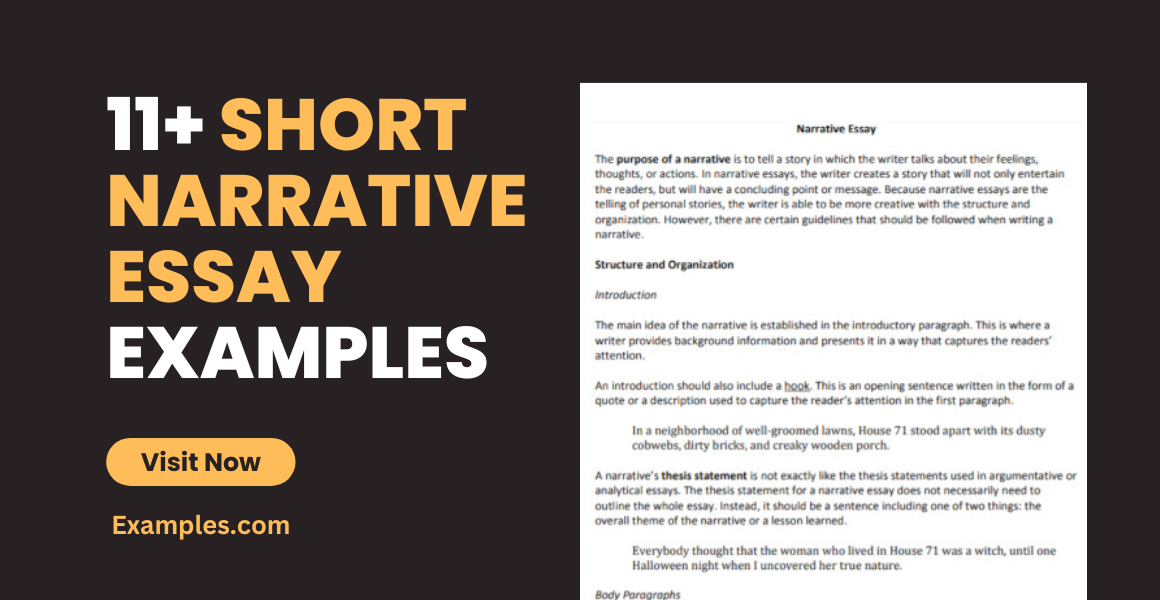
Everyone finds it interesting to tell stories about their lives or about someone else’s. Through those stories, we can get lessons which we can apply in our daily lives. This is what a narrative essay is all about. Let’s go back to your experiences when you were still in grade school. Your teacher would often ask you to write about your favorite experiences especially during Christmas season and summer vacation.
Some people would mistakenly identify a narrative essay as equally the same as a descriptive essay . They are totally different from each other, yet both of them are forms of academic writing . Look into this article to learn more about narrative essays.
What is Short Narrative Essay?
A short narrative essay is a brief piece of writing that tells a story, usually focusing on a particular experience, event, or moment. It follows a narrative structure, involving characters, a setting, a plot, and a conclusion, aiming to engage the reader through vivid descriptions and storytelling techniques within a concise format.
Best Short Narrative Essay Examples?
Title: The Summer Adventure
The scorching sun bore down on the dusty road as we embarked on our summer adventure. Packed into the old, battered car, my family and I set off for the great outdoors. The air hummed with anticipation, echoing our excitement for the unknown.
As we traversed winding roads, the landscape unfolded like a painting. Rolling hills adorned with emerald-green trees greeted us, promising the allure of exploration. The scent of pine wafted through the open windows, mingling with laughter and the crackling excitement of adventure.
Our destination? A secluded lakeside campsite embraced by nature’s serenity. The promise of tranquil waters and starlit nights ignited our spirits. Upon arrival, we pitched our weathered tent, a ritual signaling the beginning of our escape from routine.
Days melted into each other, filled with hikes through dense forests, dips in cool, crystal-clear waters, and evenings spent around crackling campfires. We discovered hidden trails, stumbled upon secret meadows, and marveled at nature’s splendid orchestra of sounds and colors.
But amidst the beauty lay unexpected challenges. Unforgiving storms threatened our haven, testing our resilience. Yet, huddled together, we found solace in each other’s company, discovering strength in unity.
As the final sun dipped behind the horizon, casting its golden glow upon the rippling waters, a bittersweet sensation enveloped us. The adventure had drawn to a close, leaving behind cherished memories etched in our hearts.
Reluctantly, we packed our belongings, bidding farewell to the tranquil haven that had nurtured us. With weary but contented hearts, we embarked on the journey back, carrying not just souvenirs but a treasure trove of shared experiences and the promise of future escapades.
The car rolled away from the lakeside, but the echoes of laughter, the scent of pine, and the warmth of togetherness lingered, reminding us of the magical summer adventure that had woven us closer together.
11+ Short Narrative Essay Examples
1. short narrative essay examples.
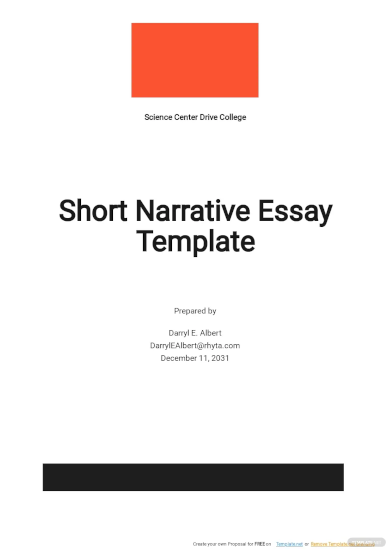
- Google Docs
Size: 27 KB
2. Narrative Essay Examples
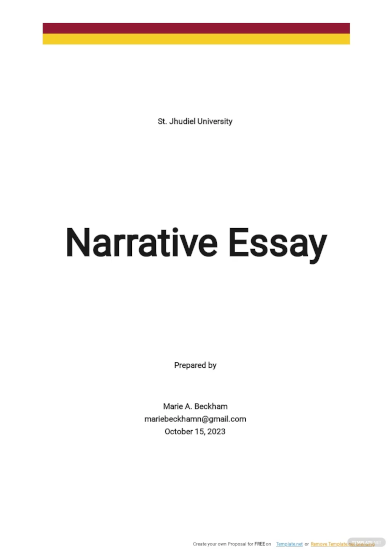
Size: 23.8 KB
3. Short Narrative Essay Template
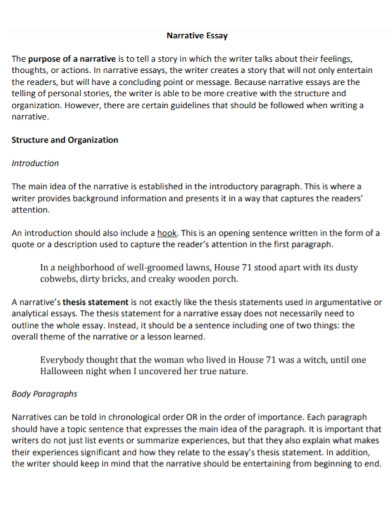
Size: 465 KB
4. Short Narrative Essay
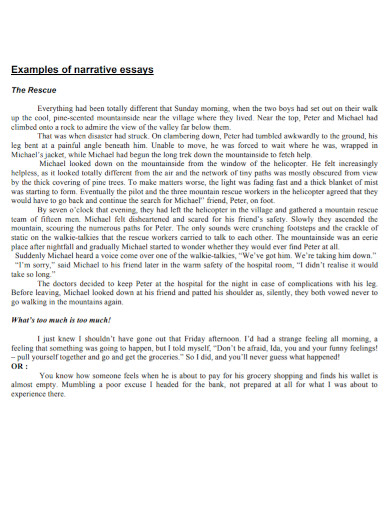
Size: 117 KB
5. Short Narrative Essay Format
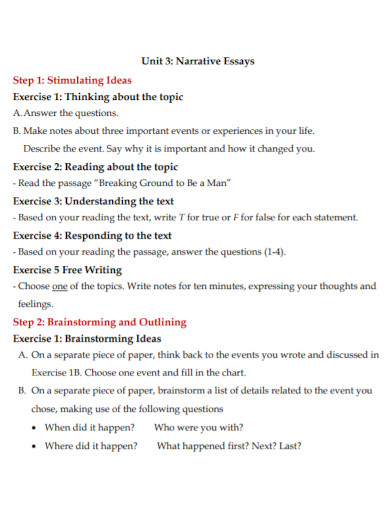
Size: 107 KB
6. The Storm Short Narrative Essay
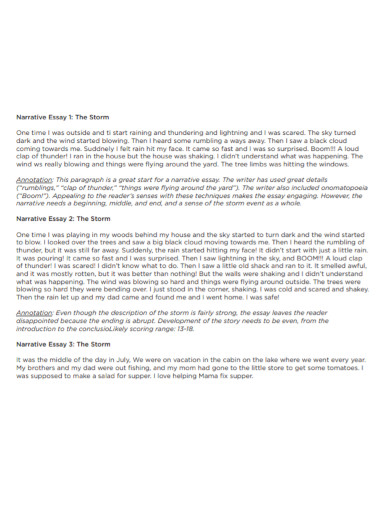
Size: 48 KB
7. Five-Paragraph Short Narrative Essay
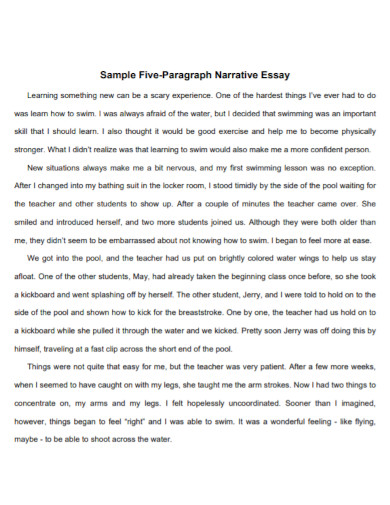
Size: 29 KB
8. Short Narrative Writing Essay
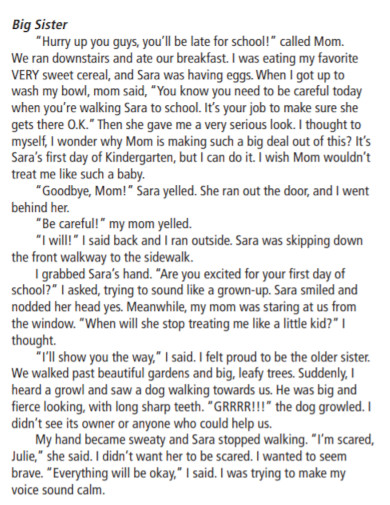
Size: 177 KB
9. College Short Narrative Essay
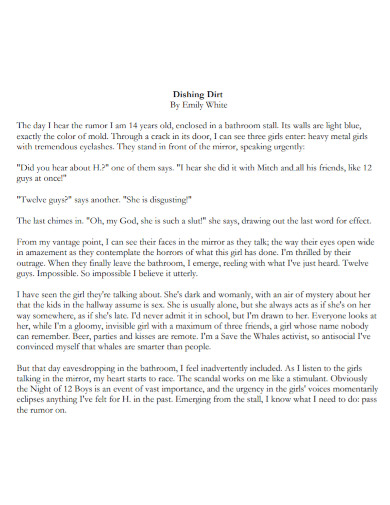
Size: 589 KB
10. High School Short Narrative Essay Examples
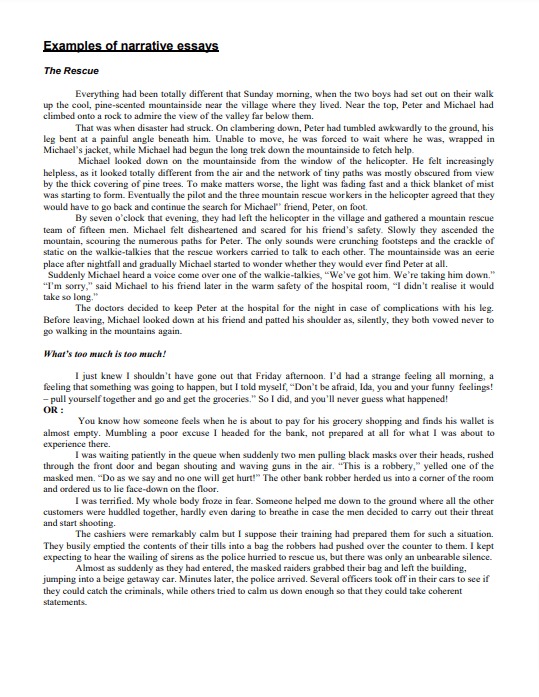
Size: 114 KB
11. College Short Narrative Essay Examples
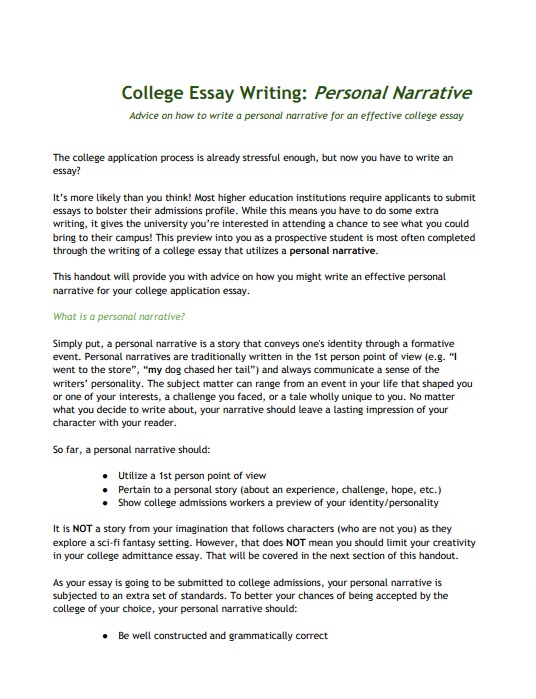
Size: 130 KB
12. Personal Short Narrative Essay Examples
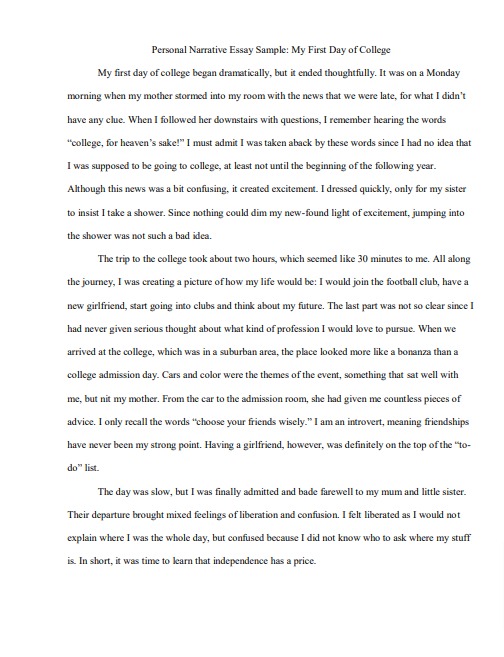
Size: 105 KB
What is a Narrative Essay?
A narrative essay is a type of academic writing that allows you to narrate about your experiences. This follows a certain outline just like what we have observed in argumentative essays , informative essays and more. The outline consists of the introduction, body paragraph and conclusion.
This is a type of essay that tells a story either from the point of view of the author or from the personal experience of the author. It should also be able to incorporate characteristics such as the ability to make and support a claim, develop specific viewpoint, put conflicts and dialogue in the story, and to use correct information. You may also see personal narrative essay examples & samples
The purpose of a narrative essay is to be able to tell stories may it be real or fictional. To enable us to write a perfect narrative essay, the author should include the necessary components used for telling good stories, a good climax, setting, plot and ending.
How To Write a Narrative Essay?
Compared to all types of academic essay , the narrative essay is the simplest one. It is simply written like the author is just writing a very simple short story. A typical essay has only a minimum of four to five paragraphs contain in the three basic parts: introduction, body paragraph and conclusion. A narrative essay has five elements namely the characters, plot, conflict, setting and theme.
Plot – this tells what happened in the story or simply the sequence of events. There are five types of plot: exposition, rising action, climax, falling action and resolution. The exposition is the an information that tells about background of the story. It can be about the character, the setting, events, etc. Rising action is where the suspense of a story begins. It helps build toward the climax of a story. Climax is the most intense part of the story. Falling action happens after the climax when it is already almost the end of the story. Resolution is the part where the problem has already been resolved.
Characters – it is the person or other being that is a part of the narrative performs an action or speak a dialogue .
Conflict – this is the struggle or the problem that is faced by the characters of the story. This can be an external conflict and an internal conflict. An external conflict is a type of problem that is experienced in the external world. An internal conflict is the type of conflict that refers to the characters’ emotions and argument within itself.
Setting – this is knowing where and when the story takes place. This can be a powerful element because it makes the readers feel like they are the characters in the story.
Theme – this is what the author is trying to convey. Examples of a theme are romance, death, revenge, friendship, etc. It is the universal concept that allows you to understand the whole idea of the story.
How to write a short narrative essay?
- Select a Theme or Experience: Choose a specific event, moment, or experience that you want to narrate.
- Outline the Story: Plan the narrative by outlining the key elements – characters, setting, plot, and a clear beginning, middle, and end.
- Engaging Introduction: Start with a hook to captivate readers’ attention, introducing the setting or characters involved.
- Develop the Plot: Write body paragraphs that progress the story logically, describing events, actions, and emotions, using vivid details and sensory language to immerse readers.
- Character Development: Focus on character traits, emotions, and reactions to make the story relatable and engaging.
- Climax and Resolution: Build tension towards a climax, followed by a resolution or lesson learned from the experience.
- Concise Conclusion: Conclude the essay by summarizing the experience or reflecting on its significance, leaving a lasting impression on the reader.
- Revise and Edit: Review the essay for coherence, clarity, grammar, and punctuation, ensuring it flows smoothly.
What are the 3 parts of a narrative essay?
- Introduction: Sets the stage by introducing the story’s characters, setting, and providing a glimpse of the main event or experience. It often includes a hook to capture the reader’s attention.
- Body: Unfolds the narrative, presenting the sequence of events, actions, emotions, and details that drive the story forward. It develops the plot, characters, and setting.
- Conclusion: Summarizes the narrative, reflecting on the significance of the experience or event, and often delivers a lesson learned or leaves a lasting impression on the reader.
How do you start a narrative essay with examples?
- ” ‘Are we there yet?’ echoed in my ears as our family car trudged along the endless highway, marking the beginning of our unforgettable summer road trip.”
- “The sun dipped low on the horizon, casting a warm, golden hue over the serene lake. It was there, amidst the tranquil waters, that my adventure began.”
- “The deafening roar of applause faded as I stepped onto the stage, my heart racing with anticipation. Little did I know, that moment would change everything.”
- “Looking back, it all started with a single decision. That decision, made in a moment of uncertainty, led to a series of events that transformed my life.”
- “The scent of freshly baked cookies wafted through the air, mingling with the joyous laughter of children. It was a typical afternoon, until an unexpected visitor knocked on our door.”
How do you start a narrative introduction?
You may start by making the characters have their conversation or by describing the setting of the story. You may also give background information to the readers if you want.
What makes a good narrative?
A good narrative makes the readers entertained and engage in a way that they will feel like they are becoming a part of the narrative itself. They should also be organized and should possess a good sequence of events.
How many paragraphs are there in personal narratives?
Usually, there are about five paragraphs.
How many paragraphs are in a short narrative essay?
A short narrative essay typically comprises an introductory paragraph introducing the story, three to four body paragraphs unfolding the narrative, and a concluding paragraph summarizing the experience.
How long is a short narrative essay?
A short narrative essay typically ranges from 500 to 1500 words, aiming to convey a concise and focused story or experience within a limited word count.
Narrative essays are designed to express and tell experiences making it an interesting story to share. It has the three basic parts and contains at least five elements. If you plan to create a good narrative essay, be sure to follow and assess if your narrative has all the characteristics needed to make it sound nice and pleasing.
Text prompt
- Instructive
- Professional
Write a Short Narrative Essay on a memorable moment with your family.
Create a Short Narrative Essay about a lesson learned from a mistake.
QuestBridge supports high-achieving students from low-income backgrounds on their path to a top college. This is your chance to dream big.
We’re here to connect Scholars and Alumni to the people and opportunities you need to reach your full potential.
Our partnerships bridge the gap between the nation’s brightest minds and the opportunities they deserve.
Learn more about who we are and how we help students dream big on their path to, through, and beyond college.
How to Write a College Essay
Let QuestBridge help you with college essay writing tips. We cover what to write about, how to get feedback, and more!
The low-income lens in college essays
Students from low-income backgrounds may not realize that they have a unique perspective to present to admissions officers. If your identity has been shaped by financial difficulties and other obstacles, consider writing about these challenges in your college essays so that admissions officers understand the full context of your successes and academic accomplishments.
Bring us into your world. We want to know you. We want to know your truth.
Student challenges and extenuating circumstances
You may describe specific challenges that you have risen above in your college essays, such as:
- You hold significant responsibilities in your household, such as providing care for an ill family member, babysitting siblings, or preparing family meals.
- You have a part-time job to pay for school activities or household expenses.
- You live with people other than your immediate family or have been in foster care.
- You experienced homelessness or other temporary housing situations.
- A parent has passed away or is not present in your life.
- You commute a long distance to attend school.
- Your family or community is not supportive of your educational goals.
- You faced obstacles because English is not your first language.
Proper tone for college essays
If you choose to write about challenges in your life, be careful to avoid using overly critical or negative language when writing a college essay. This is a good opportunity to emphasize your emotional maturity and how challenges in your life have helped you grow as a person. You may compromise that impression if your tone is resentful or excessively dramatic.
College essay topic choice
Giving admissions officers a window into difficult experiences can present your story in your college application, but there are other topics that can also make for a strong essay (e.g. a favorite book, a community service project). Whichever angle you select to tell your story, highlight the most important things that have shaped and continue to shape your identity.
The writing process: brainstorm, outline, and draft
Writing a college essay can seem daunting at first, but it doesn’t have to be. Watch our webinar, Write a College Essay that Stands Out , and download our worksheet as a template and foundation to help you craft a strong college essay. This college essay format may help you write your essay in a manner that goes beyond just a chronological explanation of your life or an expansion of your resume.
Essay feedback and revisions
Ask teachers, mentors, family, or friends for feedback on your essay. Reach out well in advance of any deadlines, and give them at least two weeks to provide feedback. Ask them in person if you can, but if you cannot, send them an email. If they agree to take a look, you can send them a message with your essay. Download a sample message below.
After receiving feedback, revise! You should plan on going through a few drafts. Here are some things to keep in mind:
- You do not have to incorporate all feedback. Accept what you think is most helpful.
- Edits and revisions should not remove your voice or completely alter your writing style.
- Pay attention to spelling, grammar, punctuation, and even formatting.
- It may help to read your essay out loud to catch mistakes you might otherwise skim over.
- Read your college essay from an admissions officer’s perspective.
- For more college essay writing tips, continue reading the FAQs below.
Detailed FAQs about college admissions essays
Mechanics, structure, and content are vital parts of a successful essay. Our Detailed College Essays FAQs page covers each category in detail to give your essay a strong start and finish. Learn about how to write a college essay, how long a college essay should be, and more.

COMMENTS
When applying for college, you might be asked to write a narrative essay that expresses something about your personal qualities. For example, this application prompt from Common App requires you to respond with a narrative essay. College application prompt. Recount a time when you faced a challenge, setback, or failure.
Purpose: Reach the peak of the story, the moment of highest tension or significance. Elements: Turning Point: Highlight the most crucial moment or realization in the narrative. Example: "As the sun dipped below the horizon and hope seemed lost, a distant sound caught our attention—the rescue team's helicopters.".
Focus on a specific event or detail to make your narrative more focused and impactful. Look for universal themes like love or personal transformation that connect with readers on a deeper level. Brainstorm ideas and write freely to uncover compelling topics. Decide on storytelling techniques like flashbacks or foreshadowing and choose a topic ...
4. Start With a Creative Writing Prompt. Chances are, you've been told to use writing prompts, but not how to use writing prompts. The best way to write from a prompt is to freewrite from the story idea, then edit from there. For example, let's say you're given this prompt: Write a story about a psychic psychiatrist.
4. The time when you overcame a fear or obstacle and how it helped you grow as a person. 5. A moment of personal growth and reflection that helped you realize something important about yourself. Here are a few personal narrative essay topics. 1. The moment you realized what you wanted to do with your life. 2.
How to Start a Narrative Essay: 16 Awesome Hooks. My eyes were red and burning as blood slowly ran down my forehead. My cramped and trembling fingers hovered over the keyboard like it was a Ouija board. I closed my eyes and, when I opened them again, the blog post was finished. It was like nothing I had written before.
When writing a narrative essay, one might think of it as telling a story. These essays are often anecdotal, experiential, and personal—allowing students to express themselves in a creative and, quite often, moving ways. Here are some guidelines for writing a narrative essay. If written as a story, the essay should include all the parts of a ...
A good narrative essay will begin with an attention-grabbing opening line. But make sure to avoid common clichés, such as "It was the best of times, it was the worst of times.". Instead, come up with something original and specific to you and your situation. For example: "My pre-calc teacher was obsessed with circles.
A narrative can spark emotion, encourage reflection, and convey meaning when done well. Narratives are a popular genre for students and teachers as they allow the writer to share their imagination, creativity, skill, and understanding of nearly all elements of writing. We occasionally refer to a narrative as 'creative writing' or story writing.
Narrative ideas. 1. Your First Love Story: Write a narrative essay about the first time you fell in love. 2. High School Hero: Personal narrative about standing up to a bully in high school. 3. Lost and Found: Narrative essay topic about losing and finding something precious. 4.
In those cases, a useful starting point will be to come up with a strong analytical question that you will try to answer in your essay. Your answer to that question will be your essay's thesis. You may have many questions as you consider a source or set of sources, but not all of your questions will form the basis of a strong essay.
A great way to come up with topics is to wholeheartedly dive into a brainstorming exercise. The more ideas about your life that tumble out of your memory and onto the page, the better chance you have of finding the perfect college essay topic. Answer my brainstorming questions without editing yourself at first.
Narrative essays are frequently assigned in college writing classes. Students get practice in selecting and narrowing essay topics, writing coherently, and making a clear point when they write narrative essays. Many students dread being asked to write narrative essays because the prompts are often personal and they ...
For instance, let's say I am writing a statement for a university application and the prompt asks the writer to describe a time when they overcame a great challenge or obstacle. The hook for such an essay might go like this: "I found myself face down on the wet mud, covered in equal parts hot shame and cold dirt.
Making an all-state team → outstanding achievement. Making an all-state team → counting the cost of saying "no" to other interests. Making a friend out of an enemy → finding common ground, forgiveness. Making a friend out of an enemy → confront toxic thinking and behavior in yourself.
How to come up with short story ideas yourself. We get it: writing prompts are an excellent resource, but you want to know how to come up with your own story ideas, maybe even ideas for a book -length project. Here are four of our go-to tricks when thinking of interesting things to write about. 1) People-watch: Hands down, this our favourite ...
A short narrative essay typically ranges from 500 to 1500 words, aiming to convey a concise and focused story or experience within a limited word count. Narrative essays are designed to express and tell experiences making it an interesting story to share. It has the three basic parts and contains at least five elements.
Step 1: Hook your reader. Step 2: Give background information. Step 3: Present your thesis statement. Step 4: Map your essay's structure. Step 5: Check and revise. More examples of essay introductions. Other interesting articles. Frequently asked questions about the essay introduction.
Ask teachers, mentors, family, or friends for feedback on your essay. Reach out well in advance of any deadlines, and give them at least two weeks to provide feedback. Ask them in person if you can, but if you cannot, send them an email. If they agree to take a look, you can send them a message with your essay. Download a sample message below.
Step 1: Start with a question. You should come up with an initial thesis, sometimes called a working thesis, early in the writing process. As soon as you've decided on your essay topic, you need to work out what you want to say about it—a clear thesis will give your essay direction and structure.